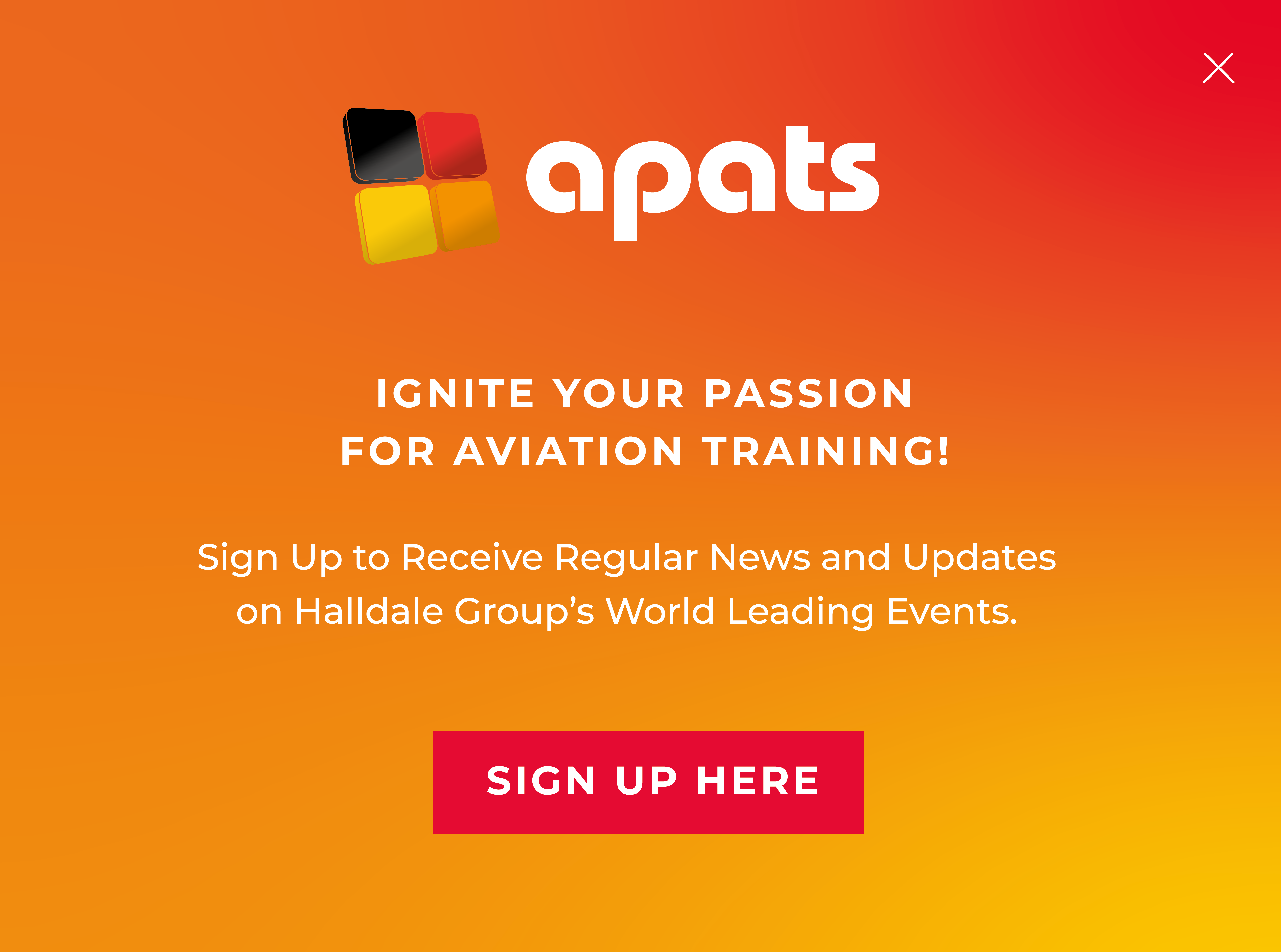Meet the Speakers & Moderators
Find out more about the APATS 2024 Speakers and Moderators.
Speakers

Kathy Abbott, PhD, Chief Scientific & Technical Advisor for Flight Deck Human Factors, Federal Aviation Administration
Kathy Abbott, PhD, FRAeS, has over 40 years of experience specializing in aviation human factors. She currently serves as the Chief Scientific and Technical Advisor for Flight Deck Human Factors to the Federal Aviation Administration (FAA) on human performance and human error, systems design and analysis, flight crew training/qualification, and flight crew operations and procedures. Dr. Abbott has led the integration of human engineering into FAA/international regulatory material and policies. She serves as the FAA liaison to industry and other government and international agencies dealing with human factors.
Pilot Training Conference
Day 2 – Wednesday 11th September 2024 – Session 6
Automation, Manual Flight Operations and Monitoring: A Study
Automation dependency/over-reliance has become an increasing concern, as advanced aircraft technology has been widely introduced. Although the increased use of automation has enhanced safety, it has likely contributed to insufficient manual flying practice and potentially a degradation of pilot skills for manual flight operations. These manual flight operations skills are essential for safe operations.
As part of the International Civil Aviation Organization (ICAO) Personnel Training and Licensing Panel (PTLP), a working group on Automation was tasked with conducting a study to examine the scope of automation dependency, other automation considerations, manual flight, and monitoring in multicrew air carrier and air taxi types of operations.
The ICAO PTLP Automation Working Group completed the Study Report, with results that are based on review and analysis of accidents, incidents, operator policies, survey of manufacturers, regulatory material, and research references. These results will be used to develop recommendations for potential changes to ICAO documents.
In addition to the ICAO Study Report results, this presentation will describe a research study on Manual Flight Operations (MFO). Simulator evaluations in both the B737 and the A320 were conducted to collect data on pilot performance in a variety of manual flight scenarios. The purpose of the study was to validate the knowledge, skills, maneuvers and tasks for manual flight operations, and to start developing data on how frequently MFO operations need to be practiced.
This presentation will summarize the findings of the Study Report, the relationship to the Federal Aviation Administration’s Advisory Circular 120-123 Flightpath Management, and the results of the research study on manual flight operations.

Captain Philip Adrian, CEO, MPS
Captain Philip Adrian FRAeS, currently serves as the CEO of MPS, the leading Fixed Base Simulator manufacturer for the Airbus A320 and Boeing B737 series. He leads two factories, one in the Netherlands and one in Germany, and an innovation team in the Netherlands. MPS partners with airlines, training organizations, OEMs and TDMs to provide tailored and innovative solutions for all training needs.
Philip started as the MPS CEO in May 2018 after 11 years at Boeing, where he fulfilled multiple roles, lastly as Chief Pilot Regulatory Strategy. He joined Boeing as an airplane instructor on 737, 777 and 787 in August 2007, and further served as Boeing’s 737/737 MAX Chief Technical Pilot, Assistant Chief Pilot, and Chief Pilot Regulatory Affairs. He was responsible for setting and coordinating global training standards and regulatory EIS support of new Boeing airplanes such as the 787, 737 MAX and 777X ranges. He was also involved in the design and flight testing of all new Boeing products, including the NMA range.
Before coming to Boeing, Philip was an airline Captain, Instructor/Examiner, and served as Head of Training, as well as in other management and executive positions for a major European airline for over 15 years.
Philip’s career started in the Royal Netherlands Air Force, where he went through Officers and Flight training, and he was a Flight Instructor prior to joining the airline in 1992.
During his entire career, he has served on several rulemaking tasks in the aviation industry, including FAA ARCs, EASA RMTs and many boards regarding Flight Safety, Aviation Security and Crew Resource Management.
Philip co-chaired the FAA ARC regarding UPRT and chaired the ICAO LOCART initiative and EASA RMT.0581/0582 on UPRT.
He currently chairs the EASA RMT.0599 regarding EBT and Performance Based Rulemaking, leads the EASA ABLE (Aviation Blended Learning Environment) task while also serving as a Team Leader of the Training Expert Group supporting EASA RMT.0196.
Philip also is the current Chair of the RAeS Flight Crew Training Group.
He is considered a Subject Matter Expert on Aviation Training, Simulation, Operational Suitability, EBT/CBT, UPRT, and world-wide operational regulatory affairs, and speaks on these issues regularly at multiple forums.
Philip holds 737, 777, and 787 Type Ratings, and has instructed on all those types. In his career, Philip has operated, flight tested and instructed for over 13,000 flight hours.
Pilot Training Conference
Day 2 – Wednesday 11th September 2024 – Session 7
Training Without Restrictions
The intent of this presentation is a “blank-sheet approach to pilot training”, which should be seen as a way forward if we were not restricted by any current regulation, and we would be able to focus solely on delivering the highest quality candidate to an airline. It therefore should also be able to form the basis for a discussion at the ICAO-level on optimization of and changes to future training, addressing important issues as access to the profession or minorities and underrepresented groups, environmental impact reductions etc.
The presentation is divided into several sections where significant improvements should lead to higher quality training at lower cost, with a lower environmental impact at the same time. The time has come to change the global view of pilot training and update the system to take full advantage of learning improvements and technology advancements.
The presentation will deal with Selection of the proper candidate, then address the change to a Competency Based Training and Assessment (CBTA). It will then show new views on Learning Methodology, Technology Improvement, and last but not least provide an updated view on the changed Competency Requirements of airlines to which the training should cater.
This presentation should be seen as the basis of a discussion to transition to better, more sustainable and more available pilot training, where cost is no longer seen as a risk, but as a solid investment into a rewarding career as an airline pilot for all who qualify for the job. This approach therefore would open up this profession to those who have historically been excluded because for lack of funding, being from a different cultural background or any other of the plethora of reasons currently restricting access to the profession.

Mark Albert, Senior Director, Commercial Business & Program Management, Boeing Global Services / AMFTA Board Director & Treasurer
Mark Albert is Senior Director of Commercial Business and Program Development within Commercial Training Solutions for Boeing Global Services. He is responsible for the Training Initiative which oversees the development and implementation of Boeing’s Competency Based Training and Assessment program. Albert is also responsible for Training Solutions Profit & Loss to include the Early Career, Digital Products, Simulation and Training portfolios.
Prior to this role, Albert was director of Operations and P&L Leader for Boeing Training Systems and Services, where he led the defense training component of Boeing Defence Services.
Albert is the President and COO for Boeing U.S. Training and Flight Services, LLC. Albert currently serves as a founding board member & Treasurer of the Aviation Manufacturer Flight Training Association (AMFTA).
Albert has a Bachelor of Arts in finance from Washington State University and a Masters in Business Administration from Seattle Pacific University. He is a graduate of the Advanced Management Program at Harvard.
Plenary Session (Pilot/Cabin Crew/Maintenance/Ground Ops)
Day 1 – Tuesday 10th September 2024 – Session 1
Airline Manufacturer Flight Training Association (AMFTA) Panel

Captain Adrian Amaladoss, Divisional Vice President, Flight Operations Training & Standards Singapore Airlines
Captain Adrian Amaladoss is the Divisional Vice President (Flight Operations Training and Standards), Singapore Airlines (SIA). In this role, he has oversight of the Airline’s pilot training. He is also rated on the Airbus A350 as an instructor.
Captain Amaladoss joined SIA as a cadet in 1994 and undertook flying training at the Singapore Flying College (SFC). He has been rated on the Learjet LJ31, Airbus A310, Airbus A330, Boeing 747-400 and Boeing 777.
Since 2009, Captain Amaladoss has served management roles in flight safety, aircraft fleet, and training management, and has been involved in a number of projects and initiatives both at an organisational and industry level.
He was General Manager, Singapore Flying College, from 2017 to 2020, and was involved in the development of its ab-initio and Multi Crew Pilot Licence (MPL) programmes.
Captain Amaladoss graduated with a Master of Engineering from the University of Oxford in 1993.
Keynote Address
Day 1 – Tuesday 10th September 2024 – Session 1

Nils Bartling, Managing Director/Examiner, inTrim GmbH
Pilot
Type Rating Instructor / Examiner
- B737
- PgDip Air Transport Management
- Management Experience as Chief Pilot and Director Flight Operations
- SME for Change Management
- Interview & Screening Preparation
Combined Session (Pilot/Cabin Crew/Maintenance
Day 2 – Wednesday 11th September 2024 – Session 8
Designing Flight Training for Future eVTOL Pilots
Urban Air Mobility (UAM) and eVTOL (electric Vertical Take-off & Landing) vehicles are in front of our doorstep. At intrim, we have been pioneering in designing a certifiable flight training programme for those pilots who will be the first in the world to operate such vehicles.
Very soon, eVTOLs will be seen over our cities (and presumably very soon in Singapore). Yet flown by pilots who will still sit in the cockpits of such vehicles (and not yet piloting remotely, at least for passenger transport), the training on this new category of aircraft requires a differing approach compared to classical airplane or helicopter type rating training. Being neither an airplane nor a helicopter, the resulting training needs require thorough research and consideration.
Our presentation will discuss our training design path we pursued, the research and development work behind it and finally the resulting training design. Emphasis is laid on the analysis of the training needs, our design approach based on human-factors research and development, the requirements for the design of new flight simulators, and how a close cooperation with OEMs and aviation authorities is paramount and made us validate this flight training programme course, which will prepare future eVTOL pilots for a safe and sustainable operation in Urban Air Mobility in just one year from now. Also, we will propose how such new training domains can achieve standards to meet a level required by operation in commercial air transport by consideration of CBTA from day 1 on, even on the OEM level.

Philip Baum, Managing Director, Green Light Ltd. / Visiting Professor, Aviation Security, Coventry University, UK
The recipient of the 2021 award for Lifetime Achievement and Contribution to Aviation Security, Philip is an ardent proponent of behavioural analysis solutions and common-sense based decision-making in all security arenas.
Philip Baum is a security professional with 35 years’ experience, primarily gained within the international civil aviation environment. His reputation is built on his common-sense approach to risk management and his desire to enable others to think outside the box and develop effective security solutions capitalising on human intuition and the intelligent use of technology.
Philip started working within the aviation industry in the 1980s, when he joined Trans World Airlines’ security subsidiary at London Heathrow. From Duty Manager at Heathrow, he moved to TWA’s International HQ where he ultimately became Manager Security Training and Auditing. He left, in 1996, to establish Green Light, through which Philip serves as a subject matter expert for the Airports Council International (ACI) in the area of Behavioural Analysis and runs training courses for them accordingly. Likewise, Philip designs and delivers the International Air Transport Association’s (IATA) Inflight Security courses.
Through Green Light, Philip has delivered training programmes around the globe, managed long-term security consultancy projects in places as diverse as The Gambia and Greenland. Philip has spearheaded new industry initiatives, including the Blue Skies conferences run by AVSECO in Hong Kong.
Philip devised and developed T.R.A.P.® (Tactical Risk Assessment of People), a risk-based security system based on non-racial profiling, observational and questioning techniques. He also established, and chairs, the Behavioural Analysis series of conferences, as well as the DISPAX World trade shows on hijacker and unruly airline passenger management.
Philip was used as an expert witness in the United Kingdom’s House of Commons’ Home Affairs Committee inquiry into aviation security in the aftermath of the attempted downing of an aircraft by a suicide bomber on Christmas Day 2009.
He was appointed Visiting Professor, Aviation Security by Coventry University in 2018.
Philip served 24 years as the editor-in-chief of Aviation Security International from 1997 until 2021. The general media utilise Philip’s services when in need of expert comment; he is a regular guest on CNN, Sky News and the BBC.
Philip’s first book, Violence in the Skies: a history of aircraft hijacking and bombing, was released on 29 February 2016.
Cabin Crew Training Conference
Day 2 – Wednesday 11th September 2024 – Session 5
Managing Cabin Safety & Security: At a Time of Global Conflice
Aviation security protocols were established following a spate of hijackings in the 1960s and 1970s, followed by the actual and attempted bombing of aircraft in the 1980s and 1990s. Terrorists, being the primary area of interest from an avsec perspective, then adopted an even more deadly modus operandi – turning aircraft into weapons of mass destruction, as witnessed on 9/11. Two decades later, in the aftermath of a pandemic, regional conflicts in Israel/Palestine and Russia/Ukraine with far-reaching effect now pose a very different threat to the industry’s operations; not just because flights might be deemed to be targets themselves, but because passengers – and crew and other insiders – have strong opinions as to what is right and what is wrong. Social media and soundbite politics add to the potential for political expression and acts of defiance threatening good order and discipline on board aircraft, exacerbated by the generally accepted worsening of mental health in society as a whole. Philip Baum explores the current challenges and offers some perspectives as to how airlines, and the broader aviation industry, might best mitigate them.
Takeaways:-
- An appreciation of 2024’s emerging threats;
- An appreciation of how such threats might impact cabin operations;
- Ensuring that xenophobic, racist, Islamophobic and antisemitic views are supressed;
- Recommended procedures for de-escalating conflict in the cabin; and
- Tackling politically sensitive topics in aircrew security training.

Captain Jean-Michel Bigarré, Founder & President, Aircraft Manufacturer Flight Training Association
Jean-Michel leads AMFTA as Founder & President, drawing upon 30 years experience in aviation and flight training. In 2019, he founded AMFTA as part of his vision to improve flight safety via the creation of a harmonised flight training level worldwide.
Previously, Jean-Michel was Head of Flight Training Worldwide & VP Training and Flight Ops, for major jet and turboprop aircraft manufacturers (notably Airbus & ATR) and has held executive positions including CEO & Member of Executive Board for different aircraft and simulator companies. During this time he was instrumental in developing training technologies whilst growing business revenue through innovative solutions, all the while focusin on enhancing flight safety. His wide airline experience also extends to the start-up and restructuring of several airlines.
Jean-Michel graduated at Air France and the French Civil Aviation University (ENAC) and began his career working for a major European airline, before joining the French Aviation Authorities to manage ab initio & advanced training. Throughout his career, Jean-Michel has flown for many different airlines and still flies on a regular basis. He is current on the A320/A330/A350 & A380 and is still acting as Instructor and Examiner on both Airbus aircraft and light aircraft.
Keynote Addresses
Day 1 – Tuesday 10th September 2024 – Session 1

Stéphane Bouey, Maintenance Instructor, ATR
Stéphane Bouey is an aeronautical engineer with a Part 66 License Category B1, B2 and C.
He has 25 years of aeronautical experience with the French Navy and various aircraft maintenance companies. He built an extensive technical knowledge on maritime patrol aircraft, Boeing 737 and ATR Family.
He gained a heavy checks maintenance experience during his experience in a Part 145 MRO and a strong ATR technical knowledge while performing technical checks at aircraft delivery flight line.
Since he joined ATR in 2015 he continued to develop his training skills delivering difference types of courses to airline certifying staff.
He is now the practical training manager defining ATR standards for practical training on both Maintenance Synthetic Training Devices and on the aircraft.
Maintenance Training Conference
Day 2 – Wednesday 11th September 2024 – Session 6
Use of 3D Synthetic Medium for Practical Training
Presentation and description of the ATR Maintenance Synthetic Training Device tool used for practical training during ATR 600 maintenance type rating course.

Randall ‘Random’ Brooks, Executive Vice President, Flight Operations, Aviation Performance Solutions
Randall Brooks, Executive Vice President of Flight Operations at Aviation Performance Solutions (APS), brings over 35 years of aviation experience and expertise in Upset Prevention and Recovery Training (UPRT). Since joining APS in 2012, Randall has been instrumental in developing and implementing UPRT programs tailored to airlines and flight schools, focusing on reducing in-flight upset conditions and enhancing pilot safety.
With more than 14,000 flight hours across 100+ aircraft types, including aerobatic and multi-engine jets, Randall’s extensive background in aviation allows him to lead effective, high-standard UPRT initiatives. His work with APS, including collaborations with Delta Air Lines (DAL) and United Airlines, showcases the tangible impact of expertly managed UPRT programs, contributing to a 50% reduction by DAL in precursor upset flight conditions.
Randall’s leadership ensures that pilots receive consistent, high-quality training that aligns with universal safety principles, preparing them to prevent, mitigate, and recover from in-flight upsets, regardless of their operational environment.
Pilot Training Conference
Day 2 – Wednesday 11th September 2024 – Session 6
UPRT Synergy: Crafting Superior Training Outcomes for Airlines and Flight Schools
The aviation sector faces the ongoing challenge of ensuring the highest safety standards in Upset Prevention and Recovery Training (UPRT) across diverse training environments. This presentation, led by Paul “BJ” Ransbury, the CEO of Aviation Performance Solutions (APS), an industry leader in UPRT, delves into the critical need for a unified approach to UPRT instructor training that transcends the operational differences between flight schools and airlines. As evidenced by the partnered APS and Delta Air Lines UPRT implementation study over 5 years and 5-million flights, 50% reductions in precursor upset flight conditions are achievable through expertly implemented and managed programs. The goal of advocating for a standardized framework that accommodates the unique requirements of both sectors is to elevate UPRT effectiveness and safety globally.
This presentation aims to harmonize UPRT methodologies to foster skill transferability and prevent negative training outcomes. Drawing on broad industry experience and insights, the presentation will explore how tailored instructor qualifications and training programs can effectively align with universal safety principles. This approach ensures that all pilots, regardless of their training background, receive consistent, high-quality instruction that prepares them to confidently prevent, mitigate, and recover from in-flight upsets.
The presentation will briefly reference the Every Pilot In Control Solution Standard (EPIC-S2) as an example of industry leadership in UPRT, showcasing the potential for standards to enhance training efficacy while reinforcing the importance of a collaborative effort to advance safety initiatives across the aviation community.
Attendees will leave with a clear understanding of the importance of a harmonized UPRT training approach equipped with strategies to implement best practices that elevate safety and efficiency in pilot training programs worldwide.

Captain Roberto Casarin, Deputy Head of Training, BAA Training Vietnam
Captain Roberto Casarin currently holds the position of Deputy Head of Training at BAA Training Vietnam.
After flying in Corporate Aviation, and as a Captain and instructor on the ATR 42/72, he has been flying Airbus aircrafts since 1998 with a low-cost carrier in Italy. From 2004, he served as a Captain and ground instructor for Vietnam Airlines on the A320/A330, and subsequently gained training experience with Etihad Airways as TRI/TRE on the A320/330 and through the MPL program.
He’s still in activity, flying on A330 in Asia.
In his role as Deputy Head of Training at BAA Training Vietnam, Captain Casarin provides training and guidance to over 500 cadets from around the world, including those from Vietnam, India, Sri Lanka, Korea, Taiwan, China, Cambodia, and others. He oversees programs such as the MPL Program with Bamboo Airways, A320 Type Rating, India DGCA A320 Type Rating, and ATP bridging course. Additionally, he conducts TRI/SFI courses for captains aiming to advance their careers.
BREAKOUT SESSION – Ab Initio Training
Day 2 – Wednesday 11th September 2024
Implementation of CBTA in Vietnam
The presentation is for sharing our experiences in the introduction of the CBTA and MPL related program for the first time in Vietnam and Indochina. The relationship and challenges with the Authorities, with the experienced instructors and with students. The solutions that we applied to overtake the obstacles and what we have learned after nearly three years of experience.
The last part of the presentation will be focused on training methods that more fits to students based on their nationality and culture, and the introduction of virtual reality.
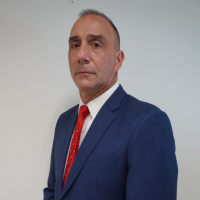
David Cirulli, Head Flight Operations - Asia, Embry-Riddle Aeronautical University - Asia
David Cirulli is a UAS Certified Remote Pilot and Embry Riddle Aeronautical University Professor. As principal of Saffron Systems PTE LTD in Singapore and Group Engineering Director of Kambyan Networks, a multinational Malaysia organization for the betterment of society with technology, he is humanising artificial intelligence through robotics process automation in field operations. By connecting Intelligent Machines and Applications in a complete Digital Twin Solution Platform for the Agro & Forestry Industry called MiDAgS™.
As former Vice-President and co-founder of CEMSol, a comprehensive, solutions-driven Engineering and Technical company he pioneered the latest in airworthiness, regulatory and safety principles for small, medium altitude long endurance, high altitude solar UAS. He has over twenty years’ experience in aviation and real-time engineering development, civil and military avionics systems, and FAA certifications.
David Cirulli is a former Systems and Software Engineer at Honeywell Commercial Aviation Division. Mr. Cirulli spent more than fifteen years in project management and development of both airborne and ground-based systems for the commercial aviation. His systems and software fly in the most popular Boeing and Airbus commercial airlines and he has participated in every major commercial aircraft development in the past two decades.
David has served as Director of Programs at ENEA TekSci where he completed the certification of electrical power distribution system for corporate jet market place and became a military avionics certification specialist using FAA DO-178B compliance. He is a professional trainer on the FAA standards for certification guidelines of both DO-178 software and DO-254 hardware. He has been involved with the FAA DER community over the past decade. As Programs Director at ENEA TekSci, he created the OSE design center, a selective product and services solution provider for the OSE operating system.
He specializes in compliance to high reliability and safety guidance standards for FAA, systems. He was verification lead on the RTCA SC-228 Detect and Avoid committee for Unmanned Systems. Most recently he began his teaching profession with Embry Riddle Aeronautical University as professor and UAS subject matter expert.
Mr. Cirulli has a BS in Aerospace Engineering from Pennsylvania State University and an MBA from the Keller Graduate School of Management.
Maintenance Training Conference
Day 1 – Tuesday 10th September 2024 – Session 2
Next Steps in Aircraft Maintenance: Unleashing the Power of Technology Enablers in UAS Robotics, Big Data, AI, and the Metaverse
In the rapidly evolving landscape of aviation, the integration of cutting-edge technologies is paramount to enhancing efficiency, safety, and precision. This presentation aims to delve into the transformative potential of technology enablers in Unmanned Aerial Systems (UAS) robotics, Big Data, Artificial Intelligence (AI), Cloud computing, and the Metaverse, with a specific focus on their applications in aircraft maintenance.
The first focal point of our exploration lies in the convergence of Big Data, AI, Cloud, and the Metaverse. We will dissect how these interconnected technologies synergistically contribute to the optimization of data gathering processes in aircraft maintenance. The utilization of vast datasets in conjunction with AI algorithms promises to revolutionize predictive maintenance strategies, leading to improved reliability and reduced downtime.
Furthermore, the presentation will spotlight the tools used in the role of \enhancing efficiency and safety in maintenance procedures. We will discuss real-world applications, exploring scenarios where UAS can be deployed for inspections and data collection, ensuring a more agile and responsive approach to maintenance challenges.
Adaptive and precision learning mechanisms will also be a core theme, demonstrating how AI-driven algorithms adapt and evolve in response to dynamic maintenance environments. This adaptive learning not only streamlines processes but also contributes to the development of intelligent systems capable of autonomously optimizing maintenance schedules.
Attendees can expect a comprehensive overview of the advancements in technology enablers, providing insights into their practical applications and the potential to reshape the future of aircraft maintenance. This presentation aims to inspire collaboration and innovation within the aviation community, fostering a deeper understanding of the transformative impact that these technologies can have on the industry.
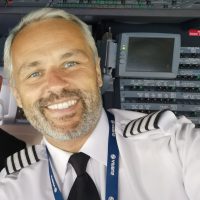
Captain Salvador Costa Pereira, Chief Operating Officer & Head of Training, Sevenair Academy
Salvador Costa Pereira is an accomplished aviator who began his journey in aviation in 1998. At the young age of 22, he became a Flight Instructor. He then went on to fly Turboprop on the B1900D before joining TAP Portugal, where he served as a First Officer for six years, flying various aircraft including the A319, A320, A321, A330, and A340. Salvador then embarked on a new adventure in 2013, joining Emirates and serving as a pilot on the A380 for three and a half years. He returned to Europe as a Captain on the A320 business jet before joining easyJet Lisbon in 2017, where he continues to serve as a Captain on the A320 family. Salvador also holds a Masters in Air Transport Management from ISEC Lisbon. With his wealth of experience and expertise, he was invited to join an ambitious project at Sevenair Academy, where his is now the Chief Operating Officer and Head of Training.
Pilot Training Conference
Day 1 – Tuesday 10th September 2024 – Session 4
Bridging the Gap Between Airline Training and Ab Initio Training
The aviation industry is grappling with a pressing issue: the shortage of qualified pilots. Bridging the gap between airline training, which assumes a certain level of aviation experience, and ab initio training, which starts with individuals having little or no flight background, has become imperative.
One of the central elements in addressing this gap is the development of adaptable training programs. Standardized curricula must be reimagined to accommodate candidates with a wide range of prior experience. Implementing modular training structures and a competency-based learning approach can help individuals progress at their own pace, tailoring their training to their unique needs. Incorporating technology, such as flight simulators and virtual reality, can offer a secure environment for trainees to hone essential skills.
Collaboration within the aviation industry is another key aspect. Airlines, flight schools, and regulatory bodies should work together to establish common standards and curricula. This ensures that ab initio-trained pilots acquire the skills, knowledge and attitudes required for a seamless transition into airline-specific training programs.
Mentorship and apprenticeship programs can play a pivotal role in transferring knowledge and expertise from seasoned airline pilots to novices. This practical exposure is invaluable in preparing pilots for real-world challenges.
In summary, bridging the gap between airline training and ab initio training is a complex challenge that demands innovative, collaborative, and adaptable solutions. By applying these strategies, the aviation industry can guarantee a sustainable supply of skilled pilots to meet the growing demand, securing the future of air travel.

Jason Davenhill, Aircrew Performance Coach, Inflow Performance Ltd.
Jason Davenhill was a national level track athlete, musician and chorister at school where he learned about what it takes to perform with grace under pressure. Joining the military he gained a commando green beret and went on to become an above average RAF Chinook pilot and instructor. His next role was a a light fixed wing instructor teaching university students to fly. After a couple of ground tours, including flight safety and post-crash management lead in the south Atlantic, Jason became the deputy chief flying instructor at the Army Aviation school of flying where he taught on helicopters and introduced performance coaching. It was the first time for ages that they had a full course pass, and four of the five prize winners came to him for coaching. Instructing at the UK’s defence Helicopter Flying School, he led the coaching team and was awarded by the Royal Aeronautical Society for the work he did building the team. His last military tour was as the air specialist in the US Rangers headquarters overseeing the conflict in Syria. Turning all his military quals into civilian ones, he now combines his coaching, leadership training and public speaking with teaching fixed wing and helicopter pilots and instructors, across the spectrum of flying. He continues his athletic and musical pursuits, leading a wind band and a couple of choirs and is now a keen ballroom dancer with his wife, an activity he says that is remarkably like flying training: technique, grace under pressure and spatial awareness with a ready-made critic within touching distance.
Pilot Training Conference
Day 1 – Tuesday 10th September 2024 – Session 3
Aircrew Performance Coaching: The Most Powerful Tool in Flying Training
Flying isn’t as difficult as we make out. Keep ‘half blue half green’ out of the front window, or the horizon in the right place on the attitude indicator and the aircraft will be happy. Where it goes wrong is when aircrew fill their brains up worrying about their performance. Then they have no capacity for any of the extra tasks. Or they get tense and, as sportsmen recognise, ‘choke’. The RAF introduced performance coaching for its aircrew 15 years ago. I have since coached civilian and military, ab initio to senior commercial captains, pilots, crewmen and air traffic controllers, students and instructors from the UK, the Middle East and America. I teach helicopters and fixed wing, aerobatics and instrument flying and I still believe performance coaching is the most effective tool in the box.
My presentation will give a brief introduction to performance coaching and then a series of examples of where and how it can be used. I will touch on training internal coaches too.

Christian Delmas, Head of Airbus Maintenance Training Organisation
- Head of Airbus Worldwide Maintenance Training MTO and Structure Training since October 2015.
- 35 years of experience in Airbus Customer Support, Supportability Engineering, Maintenance Programme Engineering and Maintenance Training.
- For 35 years, lecturer at different French schools and Universities as well as 10 years at the Civil Aviation University of China (Tianjin).
- Organisation of and speaker at various events and seminars (Maintenance Training, Scheduled Maintenance, Supportability Engineering) since 2002.
- Active member of Committees or Groups in charge of the evolution of Industry References/Standards and Regulations dealing with Maintenance Training, e.g. European Aviation Maintenance Training Committee (EAMTC) or, previously, dealing with Scheduled maintenance e.g. International MRB Policy Board (IMRBPB) and Maintenance Program Industry Group (MPIG).
- Engineering degree in Mechanics and Master degree in Propulsion Systems.
Maintenance Training Conference
Day 2 – Wednesday 11th September 2024 – Session 5
The P147 Training Organization Challenge to Manage Different Approvals
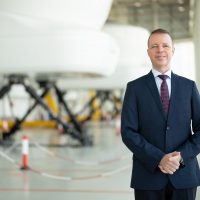
Captain Stefan Dudda, Head of Training, Etihad Aviation Training
Career Summary
8+ years of Leadership and Airline Training Management Experience.
18+ years of Training and Development of Aircrew Competencies.
Experience working on high visibility projects and programs, such as A380 Fleet-Entry-Into-Service, introduction of Evidence Based Training EBT, managed and supervised technical and professional development courses for a major organisation.
Lead, trained and developed individuals, pilots, instructors, examiners and cabin crew and resulting in promotions and career advancement. Facilitated personnel learning by incorporating new software and technology.
28+ years of safe aviation experience in international airline operation.
Airline Management
Head of Training
Since Aug 2018 Etihad Aviation Training – Approved Training Organisation. Responsible for all training delivery, student progress, development and monitoring of training programs, ownership of Operations Manuals.
Chief Flying Instructor
Sep 2017 – Aug 2018 Etihad Aviation Training – Approved Training Organisation. Responsible for FSTD training delivery, instructor standards, development and monitoring of Instructor performance.
Manager Training Standards – Airbus
Jul 2015 – Aug 2017 Etihad Airways – Operations Taraining. Responsible for instructor standardisation, assessment, training, development and monitoring of instructor performance, training programs and training devices.
Pilot Training Conference
Day 2 – Wednesday 11th September 2024 – Session 5
The Power of Resilience
In this captivating speech delivered at the prestigious aviation training conference, the speaker passionately addresses the critical intersection of competence and resilience in aviation training. Acknowledging the overuse of the term “resilience” in the context of training methodologies, the speaker emphasizes its profound significance, likening it to the vital principles of Evidence Based Training (EBT). The core message revolves around the power of resilience in ensuring safe skies.
The discourse explores the essence of resilience in aviation, not just as the ability to endure hardships but as the capacity to bounce back securely after unexpected events. Drawing attention to the often abstract nature of the term, the speaker invites the audience to replace “resilience” with “confidence,” highlighting the inseparable link between well-developed competencies and unwavering confidence therein.
The speech unveils a critical gap, common in current training approaches. It points out how, in pursuit of perfection, the industry tends to overlook the human element, relying heavily on data-driven protocols. A vivid example is presented, demonstrating how traditional grading systems and infrequent feedback may undermine a pilot’s confidence rather than fostering improvement.
The call to action centers on a paradigm shift in training organizations. Embracing failure as a catalyst for improvement, the speaker advocates for a culture that views mistakes as opportunities to refine skills. The importance of continuous learning, personal development, and the integration of platforms like “Resilientpilot.com” is emphasized to build a resilient pilot workforce capable of thriving in the face of adversity.
In conclusion, the speaker urges fellow aviators to invest in continuous learning, foster a culture of confidence-building, and recognize the importance of human connection in the learning process. The resounding message is a call to fly safely, empowered by resilience—a concept not just fashionable but foundational in ensuring the continued success and safety of the aviation industry.

Karim Eletre, CEO & Founder, Crew Lounge
Karim began his aviation career in 2005, gaining extensive experience that led him to establish Crew Lounge. He spent 11 years at Etihad Airways, advancing from Cabin Crew to Cabin Manager, and later joining the Cabin Crew Training Department, where he trained over 3,000 crew members. Karim also contributed to the alunch and training of Air Seychelles and UAE Air Force Cabin Crew.
In 2014, he joined Etihad’s Leadership and Development Team, earning an Outstanding Performance rating. He later supported leadership training at Alitalia and Abu Dhabi Airports.
In 2016, Karim became Performance Manager at Qatar Airways, leading a team of 600 Premium Class Cabin Crew and driving cost reduction initiatives. He also created the “Power of one” workshop, recognized as the airline’s most popular.
Currently, Karim is the Founder and CEO of Crew Loungs, a global benchmark in the aviation industry.
Credentials:
- Education: B.Sc. in Mechanical Engineering, MBA from Heriot-Watt University
- Partnerships: Collaborates with IATA, Harvard, and various global airlines
Expertise:
- Innovation: Delivers cutting-edge solutions
- Efficiency: Optimizes airline operations and costs
Cabin Crew Training Conference
Day 1 – Tuesday 10th September 2024 – Session 3
Why Gen-Z is Attracted by Cabin Crew Training Academy
In an era where Gen Z is reshaping traditional career paths, the attraction to cabin crew training academies has surged, offering a unique blend of adventure, personal growth, and global opportunities that resonate deeply with this generation. This presentation will delve into the role of Crew Lounge, a pioneering force in the industry, and its impact on modern cabin crew training. We will highlight how Crew Lounge’s innovative approach, including immersive video content that showcases the real lives and financial benefits of trained cabin crew members, has captivated Gen Z and aligned with their pursuit of meaningful, experience-rich careers.
We will explore why Gen Z is particularly drawn to cabin crew trianing academies, focusing on how these programs not only equip them with essential skills but also transform their lives and career trajectories. Our strategy in atrracting and engaging this tech-savvy, socially conscious generation will be discussed, revealing the deeper connections between their values and the opportunities provided by cabin crew training.
Furthermore, the presentation will emphasize the strategic importance of partnerships between airlines and training academies like Crew Lounge. By collaborating with us, airlines can enhance their workforce quality, improve customer satisfaction, and meet the evolving demands of the aviation industry. In conclusion, Crew Lounge positions itself as a game-changer in the industry, not just training cabin crew but also shaping the future of the aviation workforce by transforming the lives of those who step through our doors. Join us to explore how we are redefining what it means to be part of the cabin crew in a rapidly changing world.

Captain Daniel Gan, Head of Evidence-Based Training, Singapore Airlines
Daniel has been with Singapore Airlines for the past 23 years. He has flown the B744, A330, A340 and is currently flying the A350. Daniel also carries out instructional duties as a Line Instructor pilot. His current role as Head of Evidence Based Training allows him to work closely with stakeholders and partners in developing training programmes, and oversees the management of data, research and projects associated with the EBT programme. To stay ahead of the ever dynamic and challenging aviation landscape, Daniel sees the need to train pilots and develop their competencies using data, technology and interdisciplinary approach. His is inspired and passionate to work together with all stakeholders and partners to enhance pilot training effectiveness, develop a sustainable competency ecosystem and enable greater operational resilience.
Pilot Training Conference
Day 1 – Tuesday 10th September 2024 – Session 2
The Use of Eye Tracking Technologies and Data in Support of CBTA
For many years, the training industry and airlines have expressed and pursued initiatives to explore how eye tracking technologies could be used to better understand student or trainee scan behaviours. This knowledge could benefit training, especially since these scans are not easily observed by an instructor. As scans are highly correlated with tasking, the opportunity arises to delve into scan relationships with complex aircraft, systems, and procedures.
Pure experiential driven approaches may be melded with effective data analysis to yield insight into complexities such as “What does safe and good look like?” or “Did the student observe and crosscheck the FMS mode change”, or “What is being monitored?”. Systemic benefits in instructional delivery, retention, and competency expertise could ensue, allowing airlines safety thresholds to be defended.
This interest has been further accelerated by the transition of airlines to Competency Based Training and Assessment (CBTA), with a stronger focus on Threat Error Management (TEM) in multi-crew environments. Data-driven methods in support of the evaluation of TEM and non-technical competencies and behaviours are essential but presently data scarce.
This presentation outlines the methodology applied and the results of a collaboration conducted by Singapore Airlines (SIA) and CAE during which SIA crew were studied while utilizing two simulators equipped with eye tracking technology to determine the value and limitations of adopting gaze tracking data for pilot monitoring as additional support in the evaluation of CBTA principles in training.

Jyoti Gayan, Chief Theoretical Knowledge Instructor, Qatar Aeronautical Academy
Jyoti Gayan is the Chief Theoretical Knowledge Instructor at Qatar Aeronautical Academy at Doha, Qatar. He was an Air Force navigator and holds a CPL. He specializes in military air operations and abinitio aviation training. Jyoti is a qualified Air Force instructor and has immense operational experience on the B737 and AN32 aircraft. He had teneted the appointment of Director (Space Operations) in the Air Force. A proponent of appropriate usage of technology, his area of interest is in creating relevant, low-cost, effective technological solutions for sustainable aviation training.
Pilot Training Conference
Day 2 – Wednesday 11th September 2024 – Session 7
Training Model to Operate in an Intelligent Flight Deck Environment
The flight deck is going through a watershed moment. With unprecedented momentum, traditional AI supported sophisticated automation is progressing rapidly to foundational AI supported intelligent automation. This evolution of the intelligent flightdeck is poised to permanently change the landscape of pilot-aircraft interactions.
Events can appear singular, but they are not. They are outcomes of patterns, whose complexities increase exponentially with increase in incremental external and internal contributing micro-events. Operating in an evolving and challenging environment demands quick responses and can potentially overwhelm the pilot’s cognitive domain. Hence, the need to relook at pilot training needs.
Training for intelligent flightdeck requires a paradigm shift from ‘knowing the aircraft’ to ‘understanding the aircraft’, appreciating the dynamic relationship with the operating environment, identifying patterns to predict outcomes, and taking appropriate actions to prevent UAS. It involves developing trust in pilot-aircraft interactions through strong foundational knowledge, understanding machine-generated patterns and varied participative scenario-based training through progressive exposure to immersive technologies, collaborative critical analysis, shared predictions and decisions. Progressive increase in level of AI reduces pilot’s flightdeck ‘management’ role and prioritises the ‘leadership’ role, thereby requiring high level of competency in man-machine-integration, communication and collaboration, problem solving and decision making.
A future-ready training model is a mosaic patchwork of MPL, KSA, CBTA and EBT supported by appropriate objective-oriented technology. The existing stove-piped approach lacks underpinning knowledge and fails to stitch the elements, hence comes short in effective training delivery . The suggested model is a holistic seamless four phased (P1-P4) training-in-continuum pipeline until the pilot reaches the professional level of a commander.
Integrating AI with existing automation will enable the system to anticipate and quickly react to threats and recommend or initiate actions for safe and efficient flight operations. The challenge is whether the flight deck crew is future ready to pass the Turing test.
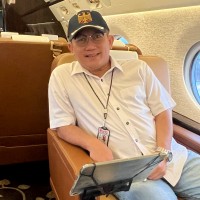
Captain Taufnik Hidayat, Head of Lion Group Training, Lion Air
2020-present: Lion Group Training Center as TRI/TRE/Evaluator A330/A320
2015-2020: Lion Air base in Indonesia as Captain TRI/TRE A330/A320
2011-2015: Airasia X Bhd base in Malaysia as Captain TRI A330
2008-2011: Airasia Sdn Bhd base in Malaysia as Captain A320
2004-2008: PT. Air Asia Indonesia base in Indonesia as Captain TRE B737
1993-2004: PT. Merpati Nusantara Airlines base in Indonesia as First Officer F28
Pilot Training Conference
Day 2 – Wednesday 11th September 2024 – Session 7
CBTA Implementation in Lion Air Group

Mark Kammer, Co-Founder, Operations Director, & Post Holder Quality, Dynamic Advanced Training
Mark is a co-founder of Dynamic Advanced Training, responsible for conceptualizing the design, build of one of the world’s most advanced and award-winning Aviation Cabin Safety Training Academies.
Mark holds master’s degrees in engineering, is a creative problem solver, multi-culturally competent and an experienced management professional.
As the Operations Director responsible for its day-to-day operations, Mark is a team player who advocates a healthy gender balance in aviation and drives the company’s training philosophy which is hands-on “Reality-Based Training”.
Dynamic delivers operationally relevant, truly experiential, engaging, immersive and most importantly fun training which aligns with its motto, ”We Entertain While We Train”.
This, compared to conventional training, ensures better learning outcomes, knowledge retention, and ultimately the effective transfer of greater skills and expertise to line operations, resulting in safer skies. The ultimate goal is to train aircrew to the level of proficiency and not just to be compliant on paper.
Cabin Crew Training Conference
Day 1 – Tuesday 10th September 2024 – Session 3
Reality-Based Training
Reality-Based Training (RBT) is a training approach that incorporates elements of stress and pressure to simulate the physiological, psychological and emotional challenges of real-world situations.
This training approach allows the participants to experience, feel, and live the information they receive and thus gain and develop the right skills to cope with and manage normal, abnormal, and emergency situations. Also, the trainees are provided with the opportunity to learn at their own pace which motivates them to gain and reinforce their knowledge, skills, and attitude. In other words, RBT aims to inoculate trainees against the negative effects of stress, improve their performance under pressure and develop own resilience, adaptability, and confidence in their abilities.
Dynamic Advanced Training is specialised in providing Safety and Emergency Procedures training for aircrew. Dynamic designed a tailor-made training environment which allows the integration of sensory inputs, allowing individuals to acquire, reinforce, and refine skills through direct experience and feedback. This multisensory approach enhances learning effectiveness and retention compared to passive learning methods. RBT also provides learners with a sense of their body position and movement within the carefully designed and simulated environment and realistic scenarios.
Repeatedly performing tasks and exercises, individuals build muscle memory, motor skills, and procedural knowledge associated with the skill being learned. Over time, this repetitive practice leads to mastery and proficiency in performing the task effectively. In view of the above, Dynamic’s trainees leave the premises not only qualified but prepared to operate aircraft safely.

Aleksandra Kapela, MSc, Associate Aviation Psychologist, Symbiotics
After obtaining an MSc in Occupational Psychology in 2013, Aleksandra has been working in aviation gaining a wide range of experience in European assessments and selection programs of cadets and active pilots whilst working with a range of airlines, aviation companies and training organisations. Aleksandra is an EAAP accredited Aviation Psychologist, an assessor and KSA100 assessment specialist.
Pilot Training Conference
Day 1 – Tuesday 10th September 2024 – Session 4
Cabin Crew Training Conference
Day 2 – Wednesday 11th September 2024 – Session 5
Clearing the Turbulence: The Role of Psychometric Screening in Safeguarding Gen Z Pilots’ Mental Wellness
In the dynamic world of aviation, where precision and safety take precedence, a new generation of pilots emerges, ready to chart the course of tomorrow’s skies. However, within the intricacies of technology and operations lies a crucial concern often overlooked: the mental well-being of Gen Z pilots. This presentation sheds light on the pivotal role of psychometric screening in strengthening the psychological resilience of these young aviators.
The presentation highlights the significance of the mental health landscape within aviation, resonating with the discerning audience of aviation professionals. Exploring the high-pressure environment that characterizes the aviation industry and the unique role of pilots, it unravels the various stressors and challenges facing Gen Z pilots on their path to excellence.
Central to this discussion is the transformative potential of psychometric screening, specifically tailored to meet the unique demands of aviation and the new generation. Through scientificially validated assessments and questionnaires, airlines and flight schools can gain valuable insights into the psychological well-being of their pilots, facilitating proactive intervention and support strategies.
Moreover, this generation of pilots operates within a distinctly different reality than their predecessors. Raised in an era of rapid technological advancement and shifting societal norms, Gen Z pilots bring forth unique challenges, demands, and attitudes towards life, work, and technology. Additionally, in a time when mental well-being is gradually shedding its taboo status, there’s an increased imperative to address these issues head-on. Implementing appropriate strategies and tools, especially in an industry where there’s no room for error, becomes paramount.

Captain Christof-J. Kemény, Captain/Senior Checkairman/Senior Training Advisor, Lufthansa Group
- Active Captain A320 Lufthansa CityLine (Lufthansa Group)
- Current Ratings A340, A320, Embraer 190, SEP and MEP
- Instructor & Examiner (Check Airman) TRI/TRE A340, A320, E190/195, CRE SEP/MEP
- UPRT Instructor on FSTD
- UPRT Training on DESDEMONA-, Spatial Desorientation-Simulator
- Design of Competency-based Refresher Online Training during COVID-19 pandemic to restart operation
- Senior Training Advisor
- Co-Founder of the OneTeamCockpit Initiative with Cpt. Dr. Christian Popp, JetBlue Airways
- Engineering Degree in Aeronautical Engineering (Munich University of Applied Science)
- Head-up Display Specialist with application in flight operation and training
- Over 16.000 hrs. as airline pilot in over 32 years active airline experience with more than 7.500 hrs instructing
Pilot Training Conference
Day 2 – Wednesday 11th September 2024 – Session 6
Push to Unload – Are We Doing it Right?
As aviation technology continues to advance, pilots are now facing a different set of challenges that require effective training solutions. This presentation aims to address the unique hurdles in delivering Upset Prevention and Recovery Training (UPRT) and Stall Training on Full Flight Simulators for various aircraft types, including A340, A320 and Embraer 190.
Drawing upon extensive experience as a certified UPRT Instructor Pilot, Capt. Chrisof Kemény will provide valuable insights into the limitations and possibilities offered by different training platforms, including the DESDEMONA simulator (sustained g-loading), Spatial Disorientation simulators, and aerobatic aircraft.
Moreover, the presentation will include first-hand data from a full completed simulator research campaign as part of a Master Thesis with the University of Graz, conducted in collaboration with simulator manufacturer AMST. This data aims to validate the efficacy of presenting UPRT-related information directly in the trainees’ field of view as well as using task-specific Flight Simulation Training Devices offering Spatial Disorientation or sustained high g-load training. The deep understanding of flight envelope limits, g-load effects, and stall protection within this specific demo setup will be explored.
An emphasis will be placed on the human factors inherent in instructor qualification and instructional performance, particularly in the critical area of “Push to Unload”. The delecate balance between prioritizing safety and understanding human performance limitations in UPRT will be examined. Additionally, the limitations faced by operators and the scope of training received by instructors on UPRT-related human performance factors will be discussed.
Attendees can expect to gain a comprehensive understanding of the challenges faced in UPRT and Stall Training, along with practical solutions and insights to enhance training effectiveness. The presentation will provide a valuable platform for industry professionals to exchange ideas and best practices in addressing these crucial training requirements.

Captain Mohamad Khairul, Head of Training, MAB Academy
Captain Mohamad Khairul is the Head of Training at MAB Academy, an ATO under Malaysia Aviation Group.
As a highly experienced Management Captain, Pilot Examiner and Trainer on the 737-800 aircraft, he brings a wealth of technical expertise and leadership skills in aviation.
Pilot Training Conference
Day 1 – Tuesday 10th September 2024 – Session 4
Cadet to Chief: An Approach to Pilot Training and Leadership Development
At Malaysia Aviation Group(MAG), we are increasingly seeing the need to address two gaps in pilot training:
- In the highly competitive and slim margin of profit airline industry, we see the need to expand pilot training programs to include business acumen and a heightened focus on customer satisfaction. This shift reflects the understanding that pilots play a pivotal role in ensuring safe and efficient flight operations and contributing to the airline’s overall success by understanding the business dynamics and prioritizing customer experience.
- In the dynamic world of aviation, pilots are increasingly called upon to assume critical managerial positions, particularly within flight operations. However, the transition to these roles is often serendipitous rather than deliberate. Malaysia Aviation Group is uniquely positioned with the appointment of a pilot as its Group Managing Director, showcasing the potential for pilots to excel in executive leadership roles. The question now arises: Can the organization replicate this success and cultivate a pipeline of pilot leaders to drive its future endeavours?
To address this, we are embarking on a new Cadet to Chief program at MAG. It is a development journey of pilots from cadets to being in the talent pool for management pilots, where the mastery of flight skills converges with the demands of leadership and business acumen. The Cadet to Chief will include training on personal development, leadership, and business acumen through classroom training and experiential learning opportunities. It is designed to cultivate well-rounded pilots capable of navigating the skies with precision, engaging effectively with customers, and demonstrating adeptness in business operations.
Ultimately, the Cadet to Chief program represents a paradigm shift in pilot training, recognizing the multifaceted nature of modern aviation leadership.
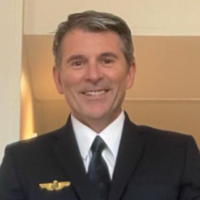
Captain Stéphan Labrucherie, Airbus Head of Flight Training Worldwide / AMFTA Director & Chairman (Airbus)
Stéphan started his flight training in 1991 with initial pilot training in France & the USA and then started his career in 1994 flying on different turboprop operations. From 1997 to 2004 he flew for French Charter operators on the B737 & A330, before joining two national carriers in the United Arab Emirates and also in China flying the A320 & A330.
Stéphan joined Airbus in 2011 as TRI on the A320/A330 and became Head of TRIs & Head of Airbus Europe Training Centre prior to his current position.
Stéphan has been Airbus Head of Flight Training Worldwide and AMFTA Director & Chairman since 2021.
He is current on A320, A330, A350 & A380 as well as TRI & TRE on A320, A330 & A350.
Since 1995 he has been particularly involved in Human Factors, CRM and Emergency Response system research and training, as well as the implementation of new training concepts such as CBTA.
Plenary Session (Pilot/Cabin Crew/Maintenance/Ground Ops)
Day 1 – Tuesday 10th September 2024 – Session 1
Airline Manufacturer Flight Training Association (AMFTA) Panel

Captain Ping Lee, Chief Pilot, HF/CRM, EVA Airways
Chief Pilot of HF CR team EVA Airways, A-321 TRI, TRE. Undergraduate and Graduate Degree from Embry-Riddle Aeronautical University. EVA Airways EBT core team member, and founding member of Asian EBT Alliance.
Pilot Training Conference
Day 1 – Tuesday 10th September 2024 – Session 3
Complacency Curve: Pilots Wake Up Call to Runway Safety
On January 2, 2024, a concerning incident occurred – two aircraft collided on an active runway due to a runway incursion. This was particularly impactful for EVA Air’s IBT team, as we had recently investigated not one, but three similar runway incursion cases, reminiscent of the tragic event at Haneda.
This presentation aims to carefully explore the commonalities among these events from a human factors’ perspective. We will share a case where an EVA Air aircraft mirrored the Haneda incident, but with a crucial difference – a vigilant tower controller quickly noticed the issue, guiding the approaching aircraft to perform a go-around and preventing a potential disaster.
The second part of the presentation will focus on the human factor details of these events. The presentation will examine the EVA’s crews actions and decision making process during these incidents. We’ll focus on complacency as the root cause, explaining this newer concept in aviation human factors. The presentation will recreate crew’s thought process, sharing insights into how complacency can affect decision-making and suggesting strategies to navigate its impact for increased safety.
The presentation’s conclusion is designed to encourage information exchange among operators. The Haneda incident is a reminder that all airlines face similar challenges. It is clear that a shared platform for operators to exhange insights, findings, and fligh tevents can significantly improve safeyt. The presentation will use Asian EBT Alliance as an example, advocating for a CRM/Human Factor platform where airlines can collaborate to ensure safer skies.

Elmar Lutter, Lufthansa Technik Philippines
Elmar Lutter worked for the Lufthansa Group for 34 years before retiring at the end of May 2024. For the last 7 years, Elmar has been President & CEO of Lufthansa Technik Philippines, with about 3,000 employees the largest subsidiary of Lufthansa Technik, where he continues to serve as an advisor. Before that, he was CEO at Lufthansa Technik BUdapest and founding CEO at Lufthansa Technik Puerto Rico. Elmar is an electrical and electronics engineer, holds an MBA in aviation, and currently undertakes a professional doctorate at Paris School of Businesss. He has also recently published a book summarizing his experience in safety management: “Error Traps – How high-performing teams learn to avoid mistakes in aircraft maintenance.”
Maintenance Training Conference
Day 1 – Tuesday 10th September 2024 – Session 3
Speaking About the Unspeakable: Intentional Noncompliance in Aircraft Maintenance
Modern safety science, exemplified by Prof. Sidney Dekker’s “New View”, takes a systemic approach to incidents and accidents and their underlying causes and contributing factors. Even intentional noncompliance, or violations, would be traced back to systems causes, not individual shortcomings. While this “New View” has undoubtedly helped managers and planners in aircraft maintenance to look beyond “human error” and address the often glaring defects in the workplace, it makes it also harder to talk to the operators and guide them about following or violating rules and procedures. This contribution tries to facilitate the discussion by introducing the notion of casual and conscious noncompliance. It implies that neither the maximalist position embedded in the SMS, nor the minimalist position of the New View can fully satisfy the need for guidance when dealing with violations.

Denis Manson, Aviation Consultant, Ten Hammers
Denis Manson has four decades in the aviation industry as an aircraft maintenance engineer and as a technical training professional, with experience across flight and ground operations in large and small aviation organisations.
Denis is a strong advocate for new technology and digital methods for vocational education, especially those resources targeting, attracting and retaining the New Generation of Aviation Professionals. He has spoken on these subjects at a number of Autralian and International conferences.
Denis has a keen interest in designing, developing and delivering technical and Human Factors training. He is currently involved in the creation of a replica airport for aviation familiarisation, English language training and other introductory skills.
Denis’ current role is as Aviation Consultant to a start-up digital media company Ten Hammers, based in Australia. Ten Hammers specialises in affordable extended reality and other digital media design for technical training.
Maintenance Training Conference
Day 1 – Tuesday 10th September 2024 – Session 2
Multimodal Sensory Effectiveness – Improving the Realism of Extended Reality
Extended reality relies on the digital twin, 3D models that replicate the real world. But how ‘twin’ is the ‘digital twin’? 60% of possible sensory information is missing!
While virtual reality training solutions are developing a stronger niche in technical training, limitations remain to the realism of VR, primarily physical feedback, human touch. Until haptic feedback tools can be reliably implemented into digital environments, the lack of tactile interaction will remain a deficiency.
For complex mechanical feedback, like experiencing the forces of moving a lever through an arc, a haptic glove is insufficient. Until they improve, mixed reality (MR) techniques may help.
Logic (and research) says – the more senses, the better! Multimodal sensory information has been shown to enhance situational awareness and training effectiveness.
Development effort is being applied to combining the physical with the digital in technical training and recreation. It’s already being done in a number of situations, such as helicopter rescue winching training and parachute experiences.
Some bold mixed reality projects are combining a digital aircraft cabin door with a modular physical door, containing replica handles. Another project uses a physical component to enhance virtual reality fuel tank entry training.
These projects will exploit all the advantages of the digital training environment. Lush visual and aural experience. Doing things we can’t do in real life. Safety, efficiency, cost-benefits. When the digital is coupled with a physical component, this provides greater sensory effectiveness and better training outcomes. The best of the physical and digital worlds.
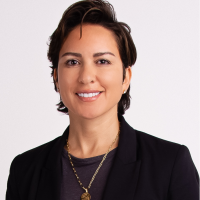
Imen Mhalla, SEP Supervisor, Presidential Flight, Head of State Airline, Abu Dhabi
- Safety and Emergency Procedures Supervisor and overall in charge of the Cabin Safety Training and Procedures, in Presidential Flight, Head of State Airline in Abu Dhabi, UAE
- Presidential Flight Cabin crew focal point to The UAE General Civil Aviation Authority (GCAA).
- Chairman, Gulf Cabin Safety Group
- CRM and Human Factors Instructor for pilots and cabin crew
- Designated Cabin Crew Examiner
- Total aviation experience of 24 years
Previous Experience:
Etihad Airways, Abu Dhabi:
- Training manager at Etihad Airways, in charge of the Boeing Fleet, Annual Cabin Crew Recurrent and Senior Cabin Crew Member Training (2013-2016)
- Lead Cabin safety trainer (2014-2016)
- Cabin safety trainer (2009-2014)
- Cabin Manager (Purser): 2008-2011
- Premium class cabin crew: 2006-2008
Tunis Air, Tunisia
- Premium class cabin crew at Tunisair (2000-2006)
Cabin Crew Training Conference
Day 1 – Tuesday 10th September 2024 – Session 3
New Methods of Leading
We always see in our eyes the beauty of aviation industry and its evolution throughout the years, and the huge part of that is the ‘people’, from completely different nationalities, cultures, religions, believes and age.
The presentation will elaborate more specifically about the Generation Z, that is hugely being part as a work force in the cabin crew community, in private and commercial airlines.
Gen Z, is the generation born between 1997 and 2012. The first Gen Zers were born when the internet had just achieved widespread use. They’re called “digital natives”—the first generation to grow up with the internet as a part of daily life. Globally, Gen Z is growing fast: Gen Zers will make up a quarter of the population of the Asia–Pacific region by 2025, which next year.
Gen Zers are known for working, shopping, dating, and making friends online; in Asia, Gen Zers spend six or more hours per day on their phones.
So, the question is: Do we need to change the way we do things in training or no?
If yes, how and to which extend?
How efficient will be the implementation of the digital and virtual tools in the cabin crew training from AI, VR, CBT and gamification using the Company or Personal Electronic Devices.
The presentation will end with the anticipated impact of new technology and methodology in training and also the opinion of the Civil aviation Regulators.

Mike Miller, Director, Learning Programs, Boeing Global Services
Mike Miller is Director of Learning Programs, Boeing Global Services. Mike’s team is responsible for the design, development and deployment of all commercial flight, commercial maintenance and early career training programs.
Prior to his current role, Mike was the Senior Manager of the Learning Design Team, where he led the development of Boeing’s Competency Based TRaining and Assessment (CBTA) Programs. Mike also served as the Manager, Fleet Training Development team.
Mike joined Boeing in June 2018 after a 23-year career in the United States Air Force (USAF), culminating as the Commander, 314th Operations Group, where he was responsible for all USAF C-130 formal flight training and he led the Department of Defense’s largest international flight training center.
Mike served in a variety of operational, staff and command positions during his Air Force career, including: Director, Air Mobility Division, Air Forces Central Command; Commander, 774th Expeditionary Airlift Squadron; Commander, 61st Airlift Squadron; Director of Operations, 61st Airlift Squadron; and Executive Officer to the Director of Air Force Operations, Headquarters, United States Air Force.
Mike is a 1995 graduate of the United States Air Force Academy, where he earned a Bachelor of Science Degree in English. He also holds Master’s Degrees in Military Operational Art and Science and Strategic Studies from Air University. Mike is a Command Pilot with over 3,500 flying hours, 700 Evaluator/Instructor hours and 500 combat hours.
Pilot Training Conference
Day 1 – Tuesday 10th September 2024 – Session 2
Competency-Based Training and Assessment (CBTA), Threat and Error Management (TEM) and the Use of Multiple Data Sources to Enhance Safety
Competency-based training and assessment (CBTA) and Threat and Error Management (TEM) rely on the use of multiple data sources to enhance safety. Boeing has been working with our customers, regulators and the broader industry for 5+ years on collecting various sources of data, mapping to a TEM and CBTA framework and using root cause analysis to develop and recommend changes to policy, operations and training. This presentation provides an update on how CBTA, TEM and Safety Data Analytics (SDA) combine to produce safer outcomes.
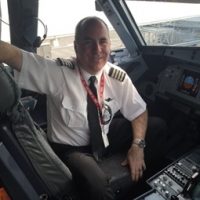
Captain James "Jimmy" Mitchell, EBT Program Manager & Check Pilot Accreditor, Jetstar Airways.
He started his flying career at Moorabbin Airport just outside of Melbourne where he became a Grade 1 Flying Instructor, specializing in Instructor Training. He then spent a few years flying RPT and charter work around the mountains of Papua New Guinea, where he was involved in Training and Checking and later became the Deputy Chief Pilot. Moving back to Australia in 1998, he has flown with the various iterations of airlines that eventually morphed into Jetstar Airways, which is a part of the Qantas Group. During this time, he has been heavily involved in Training and Checking on the B1900, B717, and A320 fleets. In 2015, Jimmy completed his master’s degree in aviation management, where his thesis paper was written on EBT. He then led the implementation of EBT into the Jetstar Group of Airlines and currently holds the position of EBT Program Manager and Check Pilot Accreditor.
Pilot Training Conference
Day 2 – Wednesday 11th September 2024 – Session 5
Safety Results from Evidence-Based Training
Jetstar has taken the lead in the implementation of EBT for both pilots and cabin crew in Australia. Their success with EBT has led to the creation of EBT programs throughout the region.
Their journey into EBT began when Jimmy met Mike Varney, the Chief Executive of Salient, at this event back in 2016.
Jetstar engaged with Salient to adopt EBT, working with instructors and developers and assuring the authority CASA of the potential benefits. Jetstar started with a “Mixed Implementation” maintaining the licensing proficiency check. Their success with the program has led to a pathway in Australia direct to full implementation, and this has been adopted by many airlines in Australia.
The presentation will address the objectives, engagement with instructors who are at the leading edge of the paradigm shift. In addition, ensuring that the program and instructors engage pilots in an experience relevant to their needs, backed by a non-judgmental approach to coaching and feedback. As the program matured attention was given to airline specific safety issues and a process of analysis to determine effective mitigations in FSTD training. Before each Cyclic build this is considered so that optimized training is carried out in a full circle approach to safety. This has provided excellent results in reducing risks within the Flight Operations area.
The presentation will cover several key aspects, including the defined objectives, involving instructors who are pioneers in the ongoing shift in practices. Exploring what Instructors really think of EBT and their insights into why Pilots are preforming better, when it counts. Furthermore, it will discuss how the program and instructors engage pilots in an experience systematically tailored to their needs. This is underpinned by an approach to coaching and feedback that avoids passing judgment. As the program evolved over time, significant attention was devoted to addressing safety concerns unique to the airline.
The response from pilots was immediate and powerful; they loved the program. But what about safety benefits? We see pilot buy-in as a major and necessary first step. Pilots engage in the learning process and begin to apply what they have learned. Building confidence is such an important part of an effective EBT experience. This confidence in managing unexpected situations in an FSTD develops over time and is often referred to in air safety reports.
Over time the application of learning by exposure creates more reliable processes in the flight deck and builds resilience. This can now be shown with mature EBT operators who have taken the right approach.
The journey is one of striving for excellence, and in this a process for engaging each pilot in their own experience, the aim being to help them to develop as Individuals in a program of continuous improvement. Engagement, reflection, learning and the application of new tools to line operations has delivered substantial benefits.
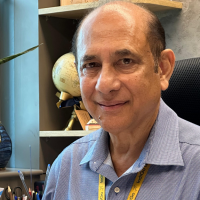
Captain Ashim Mittra, Senior Vice President Flight Operations, IndiGo
Capt. Ashim, FRAeS, began his aviation career in 1978 as an Aircraft Maintenance Engineer, working with the HS 748 and B737-200 aircraft. He advanced to Flight Engineer on Airbus A300s, refining his expertise over five years. Driven by a desire to transition into the cockpit, he obtained his FAA license in 1986, joined Indian Airlines as a First Officer, and advanced to the A320 fleet.
In 1994, Capt. Ashim joined Air Lanka, the returned to the domestic sector as a Check Pilot on B737s with Alliance Air in 1997. The liberalization of India’s civil aviation sector led him to Air Sahara’s B737 NG fleet and a brief tenure with Air India Express. He then joined IndiGo, where he rose from Captain to Fleet Captain (Southern Region), Trainer, and ultimately, Director of Operations by 2012.
Since 2012, Capt. Ashim has held influential roles, including Instructor Trainer on Competency-Based Training and Assessment (CBTA), Designated Examiner for the Directorate General of Civil Aviation (DGCA), and the nation’s first Synthetic Flight Examiner. Appointed Senior Vice President of Flight Operations in 2017, he oversaw IndiGo’s growth from 24 to 380 aircraft.
Under his leadership, IndiGo became the 3rd largest airline by market capitalization and 7th by seat capacity globally, leading as the top Airbus Neo operator and securing a landmark order for 500 A320 series aircraft.
Capt. Ashim is honored to share his insights as a keynote speaker.
Keynote Address
Day 1 – Tuesday 10th September 2024 – Session 1

Richard Muralee, MD & Principal Consultant, Grip Training & Workshops Sdn Bhd
Richard Muralee is the founder of GRIP Workshops Sdn Bhd and Co-Partner of Finet International and The Capacity Specialist in Cambodia. He was the co-founder of the Shining Star Foundation in Malaysia. Richard has more than 25 years experiences in empowering personal change and Organisation Behavioural programs amongst NGOs, corporate and government sectors. His key competencies lie in diagnosing people process concerning organizational issues where he challenges existing assumptions and structure to realize greater potential, sustainability, and growth in businesses. His Employee Engagement Series is most popular in Asia.
Richard is a sought-after Advance Empowerment Coach and Facilitator in Asia and has trained many teams to triumph in embarking personal and organizational transformation in multiple industries in Malaysia, Singapore, Myanmar, Cambodia, Thailand, Bangladesh, Dubai, Sri Lanka, South Africa and Belgium. He has the most unique ability to engage with audience from a diverse background, culture, rank and industry and have them interact with him throughout any workshops that he conducts is simply remarkable.
Over years of his passion, Richard had influenced personal transformation in countless individuals and professionals, primarily through his proprietary modules of empowerment coaching, and Train-the-Trainer’s workshops to achieve peak growth. Some of his exclusive proprietary modules covers ‘Empowering the limitless You’ workshop, ‘What’s Next’ Transformation Camp for CEOs and high-level Product Innovation Consulting with Key Executives and Directors. He is the selected few by Malaysian Institute of Management (MIM) as their associate master facilitator and is also an affiliate with Asia Finance & Investment Limited (Cambodia) including serving as the Learning Director for ANZ Institute (Australia)..
He has conducted more than 800 DeepChange & CoreEmpowerment workshops in helping participants reconnect with their true authentic self. He released an e-book called ‘Emerge Empower Embrace YOU’ in August 2015. He recently published his second book called Align, which is available in all major bookstores.
Richard holds a Masters in Human Resource Management & Industrial Relations (Australia), LLB (Honours) London, a professionally qualified practitioner in NLP and Process-oriented psychology. He is a certified HRDF trainer with Human Resource Development Fund (Malaysia) and a member of the Society of Neuro-Linguistic Programming. He is currently pursuing his Professional Membership with Indian Society for Applied Behavioural Science (ISABS)
Cabin Crew Training Conference
Day 1 – Tuesday 10th September 2024 – Session 4
Workshop: Creating Self Awareness & How to Apply This in Training

Ju Li Ng, Divisional Vice President, Cabin Crew, Air India
Ju Li Ng is currently the Divisional Vice President of Cabin Crew at Air India. She joined Air India in 2023 and is now leading cabin crew in their rebranding and reinvention of inflight customer exerience, touted by journalists as the “Mount Everest of Corporate Turnarounds” after privatization.
Ju Li’s career in cabin crew management spans over 26 years, beginning as a management trainee with Singapore Airlines in 1994. She was subsequently involved in two Singapore AOC at Jetstar Asia Airways in 2004 and Scoot in 2012, heading cabin operations for the start-ups in low-cost carriers. She also led the cabin crew in the airline mergers for Scoot and Tigerair in 2016 and earlier with Jetstar Asia and Valuair in 2005. She is on her largest merger project yet – amalgamation of Vistara and Air India, two full-service carriers totalling 12,000 cabin crew across 6 bases, slated for completion in early 2025.
Other than in airline management, Ju Li is a keen trainer and educator. She had previous stints as General Manager Inflight Training at Jet Airway, Senior Lecturer at Temasek Polytechnic and Adjunct Lecturer at the Royal Melbourne Institute of Technology, Management Development Institute of Singapore and London School of Business and Finance.
Cabin Crew Training Conference
Day 2 – Wednesday 11th September 2024 – Session 5
The Re-making of the Air India Cabin Crew
The instrumental role of cabin crew training in the new Air India branding and all new inflight experience.

Chris Ranganathan, Chief Learning Officer, Commercial Aviation Training, CAE
An experienced pilot, Chris has been involved in pilot training and management for over 20 years, in an aviation career spanning more than 30 years.
During his career, he has led the operations and training departments at several airlines, where he was instrumental in the introduction of innovative training concepts such as AQP, EBT and MPL.
In his current role, he is responsible for leading CAE’s Civil Global Training Organisation, including Regulatory Affairs, Training Policy & Learning Science, Aviation Safety, Quality Assurance and Training Performance.
A former CAT Magazine Pioneer award winner, Chris holds a Masters degree in aviation management and is a Fellow of the Royal Aeronautical Society.
Pilot Training Conference
Day 1 – Tuesday 10th September 2024 – Session 2
The Use of Eye Tracking Technologies and Data in Support of CBTA
For many years, the training industry and airlines have experessed and pursued initiatives to explore how eye tracking technologies could be used to better understand student or trainee scan behaviours. This knowledge could benefit training, especially since these scans are not easily observed by an instructor. As scans are highly correlated with tasking, the opportunity arises to delve into scan relationships with complex aircraft, systems, and procedures.
Pure experiential driven approaches may be melded with effective data analysis to yield insight into complexities such as “What does safe and good look like?” or “Did the student observe and crosscheck the FMS mode change”, or “What is being monitored?”. Systemic benefits in instructional delivery, retention, and competency expertise could ensue, allowing airlines safety thresholds to be defended.
This interest has been further accelerated by the transition of airlines to Competency Based Training and Assessment (CBTA), with a stronger focus on Threat Error Management (TEM) in multi-crew environments. Data-driven methods in support of the evaluation of TEM and non-technical competencies and behaviours are essential but presently data scarce.
This presentation outlines the methodology applied and the results of a collaboration conducted by Singapore Airlines (SIA) and CAE during which SIA crew were studied while utilizing two simulators equipped with eye tracking technology to determine the value and limitations of adopting gaze tracking data for pilot monitoring as additional support in the evaluation of CBTA principles in training.
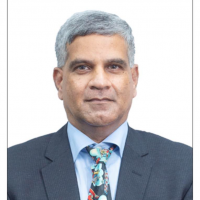
Captain Srinivas Rao, Head of Training, AAG Center for Aviation Training, Chennai
Highly accomplished aviation management and training professional with a unique mix of pioneering startup airlines, strategic business planning, advocating advanced training methods and use of technology in airline operations and training. Proven experience in driving end-to-end airline turnaround efforts, achieving AOC certification, and maintaining superior standards within challenging operational contexts. With over 25 years in airline training and predominantly in ab initio training, I aim to bring changes in training delivery to make learning easier and meaningful to trainees tailored to their learning style.
Professional Summary
- Currently Head of training at AAG center for aviation training (ACAT) at Chennai, India overlooking the ATO training operations
- Over 35 years of management and training experience within airlines/aviation industry, with strategic expertise in starting up airlines, business financial modelling, and adoption of IT systems specificity designed for airline startups and training.
- Associated with introduction of Evidence based training and multi-pilot licence programs with airlines.
- Hands-on experience with the latest in aviation technologies focusing on fuel efficiency and modernization, training management systems, MIS and data capture.
- Successfully led the airline launch during the challenging Covid times and associated with driving airline transformation projects.
- Proven ability to inspire, lead, and guide teams towards achieving their highest potential, bolstered by strong mentoring capacities and seasoned expertise in aviation.
Cabin Crew Training Conference
Day 2 – Wednesday 11th September 2024 – Session 7
Simplifying Aviation Training with Mind Maps
In today’s changing aviation training landscape, using innovative teaching methods is essential. This abstract looks at how mind maps help speed up learning for aviation students and instructors. As Generation Z enters the aviation field, their comfort with digital tools and preference for visual learning requires a shift from old-school teaching methods. Mind maps, with their visual and interactive qualities, fit well with these new learning styles, bringing major advantages to aviation education.
Mind maps are key in breaking down complicated aviation topics into easy-to-understand, visually appealing and hierarchical formats. This helps Generation Z students and instructors, making it easier for them to grasp complex subjects like aircraft systems and procedures through colors, images and spatial layout. Instructors can also use mind maps to make short, interesting lesson plans, boosting student understanding and participation.
Mind maps stimulate both creative and analytical thinking, aiding in more effective learning and problem-solving. They work well in group settings, where students can work together on flight scenarios and decision-making exercises. Mind maps encourage critical thinking and independent learning, which are vital in aviation. They enable students to tailor their learning journey by enhancing their grasp of difficult aviation concepts. They serve as quick-reference guides for revision, allowing for easy recall of key concepts and their inter connections.
In conclusion, integrating mind maps into aviation training is a big step forward in teaching methods, matching the learning styles of today’s students. This forward-thinking approach not only improves upon traditional learning but also ensures a more effective, engaging, and comprehensive educational experience for future aviation professionals, speeding up their learning process.

Frank Rister, Test Pilot/Senior Researcher Pilot Training, inTrim GmbH
Born 1971
Experimental Test Pilot
Type Rating Instructor / Examiner
- B737,777,787 / A320
- Test Pilot SpaceJet Program
- M.Sc. Aeronautics & Astronautics / Cognitive Science
- SME for Flight Test, Functional Check Flights, UPRT
- Training Programme Developer
Combined Session (Pilot/Cabin Crew/Maintenance)
Day 2 – Wednesday 11th September 2024 – Session 8
Designing Flight Training for Future eVTOL Pilots
Urban Air Mobility (UAM) and eVTOL (electric Vertical Take-off & Landing) vehicles are in front of our doorstep. At intrim, we have been pioneering in designing a certifiable flight training programme for those pilots who will be the first in the world to operate such vehicles.
Very soon, eVTOLs will be seen over our cities (and presumably very soon in Singapore). Yet flown by pilots who will still sit in the cockpits of such vehicles (and not yet piloting remotely, at least for passenger transport), the training on this new category of aircraft requires a differing approach compared to classical airplane or helicopter type rating training. Being neither an airplane nor a helicopter, the resulting training needs require thorough research and consideration.
Our presentation will discuss our training design path we pursued, the research and development work behind it and finally the resulting training design. Emphasis is laid on the analysis of the training needs, our design approach based on human-factors research and development, the requirements for the design of new flight simulators, and how a close cooperation with OEMs and aviation authorities is paramount and made us validate this flight training programme course, which will prepare future eVTOL pilots for a safe and sustainable operation in Urban Air Mobility in just one year from now. Also, we will propose how such new training domains can achieve standards to meet a level required by operation in commercial air transport by consideration of CBTA from day 1 on, even on the OEM level.
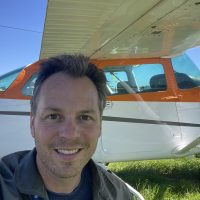
Alexander Robinson, New Business Manager, Asia-Pacific, Ocean Software
Alexander Robinson is dedicated to improving pilot training and safety-critical operations, holding over twenty years of experience across civil and military aviation & aerospace domains.
Alexander currently leads business development for Ocean Software, a provider of flight training & operational management solutions. Prior to Ocean Software, Alexander worked across a range of aerospace-technology industries, developing pilot training & operational capabilities and bringing these to market.
Alexander serves as a Non-Executive Director of the Australian Industry & Defence Network (AIDN), as well as a Safety & Technical Representative for the Australian Federation of Air Pilots (AFAP), and a trained Peer Supporter for Flight Safety Foundation’s Community and Peer Support program. Alexander write regularly for various aerospace industry publications, and is a guest lecturer in Aviation Safety through the University of New South Wales – Australian Defence Force Academy.
Alexander maintains a current pilot licence, and has been awarded an Executive MBA, Bachelor of Business, and Diploma of Government.
Pilot Training Conference
Day 1 – Tuesday 10th September 2024 – Session 3
Human-Machine Learning: Improving Pilot Training and Operations using Predictive Analytics & Insights
The main objective of this presentation is to demonstrate the practical application of machine learning predictive analytics in addressing and improving pilot training & operational problems, guided with human subject matter expertise and interpretation.
Specifically, the applied research looked at ab-initio and advanced flight training results over a 4-year period. Following consultation with experienced aircrew instructors who helped define an objective (i.e. who was likely to graduate pilots’ course), a Machine Learning model was developed to identify predictive insights into success factors, from selected course training data. This presentation illustrates the outcomes, interpretation, objectives, methodology, and data used to address pilot training & operational challenges, and highlights the potential value in terms of:
- Safety – including identifying trends and potential issues, Safety-II behaviours, currency & qualifications alignment, proficiency optimisation;
- Training effectiveness – including competency-based training, quality of training outcomes, curriculum improvements & design, resource optimisation, curriculum design;
- Training efficiency, and throughput – including course schedule flow (bottlenecks), upgrade streaming, continuous assessment, individual-based learning & remediation;
- Applications – includig a practical framework, tactical vs strategic application, and examples of datasets and objectives.

Ascanio Russo, Aircrew & Medical Standards & Implementation Section Manager, EASA
Ascanio joined EASA in 2015 as flight crew licence standardisation team leader and deputy project manager for the standardisation of Examiner. Since June 2022 he is the Aircrew & Medical Standards & Implementation Section Manager. He has a university degree in science and technology of aviation. He started his professional career in 1991, as business jets co-pilot. A few years later he moved to a larger air carrier where, in 1995, he joined the training department. Since then, he has always worked in the training environment and still continues to be an instructor and senior examiner on B737 and B747. An Airline Captain since June 1998, he has flown mostly Boeing aircraft (B737, B767 and B747). From 2007 and 2015 he held several managerial positions, including safety manager, head of training, crew training and flight operations nominated person.
Pilot Training Conference
Day 1 – Tuesday 10th September 2024 – Session 2
Ongoing Rulemaking Activities to Enhance Training
EASA has received a request from Member States and industry to initiate a rulemaking task to review the instructors’ requirements in order to introduce more adequate and proportionate provisions to ensure consistent and proportionate provisions for instructors, ensure a holistic approach to pilot training, and introduce provisions stemming from the competency based approach. In addition, EASA decided to introduce the FSTD Capability Signature (FCS) concept to ensure that FSTDs better facilitate current and future training needs by establishing the necessary simulation fidelity levels required to support training tasks for aeroplanes, and VTOL aircraft, including helicopters, tilt rotor, powerlift and gyroplanes.

Søren Seindal Agner, CEO, AEROTEAM Training Solutions
I have been in aviation for more than 35 years.
• Tour-guide / Cabin crew for a charter operator in Denmark for 10 years.
• Pilot for various airlines in Denmark for 10 years, i.e., SAS flying the MD80.
• ATPL ground instructor for 15 years.
• CRM instructor and Assessor since 2004 /2010
• MCCI simulator Instructor for Multi Crew Coordination courses
• Cabin Crew Safety and Emergency Instructor – A319/A320, ATR-72
• Development of KSA100 Training and Assessment program.
• Approved Training Manager for a Part 147 Maintenance Training Organisation.
• Member of the Danish Flight Safety Council since 2010 dealing with human factors.
I have been involved in training for more than 20 years and am always looking for new ways to enhance the learning experience.
Cabin Crew Training Conference
Day 2 – Wednesday 11th September 2024 – Session 6
Workshop: The Next Evolution of Cabin Crew Training
Introducing Scenario-based Training into the Cabin Crew Training Environment.
We believe in ACTIVE LEARNING.
We need to facilitate the training in a way, so we obtain the greatest learning effect of our training.
By introducing relevant scenario-based training, we create a link between classroom theoretical training and practical training as well as to the operational environment. By engaging the participants in relevant training scenarios, we increase the motivation and the skills of the trainees as well as of the instructors.
Furthermore, we are given the opportunity to evaluate and assess the competencies while training in the classroom. By using ICAO Core Competencies or EASA Competence Assessment Criteria, we can provide relevant and better feedback to the Crew. We can then transfer this knowledge to the operational environment in the aircraft and compare this to performance in real life.
It is also of utmost importance that the assessment itself is valid and that the instructors have the competency to assess competencies, so there is a general line in the assessment within the company. We have been assessing the technical skills of pilots for many years, but it might be new to the cabin crew. However, when it comes to assessment of non-technical skills, there is still a challenge in evaluating the performance, since we are looking at so many different parameters and behaviours.
Therefore, the assessment must focus on observable behaviour and not the specific task and furthermore, should contain an element of and a possibility to exercise self-assessment.
Introducing active learning and scenario-based training into the training environment is one way of obtaining a high level of learning and at the same time being able to assess competencies of the cabin crew, as well as enhancing the knowledge and skills of the instructors.
Our MAYDAY Digital Solution also provide the possibility to collect valuable data from the training sessions for highlighting CRM and Human Factors issue within the company. This is valuable information for your SMS, EBT, and CBTA programs.
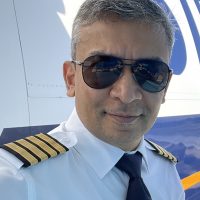
Captain Hari Shankar, Singapore Airlines
Capt. Hari Shankar joined the Singapore Airlines group as an ab-inito cadet in 1996. With a remarkable 27-year career, he has piloted the B737, A320 and now commands the legendary Queen of the Skies. In that career span within the airline group, he has dedicated over 15 years to training and has 19 years of experience in the Crew Resource Management and Human Factor fields.
Some of Hari’s original, ground-breaking Safety and Training initiatives have set new standards across the industry, earning him invitations as a keynote speaker in Japan, Korea, Ireland, Israel, and Athens. His visionary ideas have captivated audiences worldwide, inspiring not just aviators, but also healthcare professionals and young, aspiring aviators.
With a Bachelor of Science degree from the National University of Singapore and multiple academic certifications in the fields of Auditing, Safety, Human Factors and Investigation, Hari combines academics with his academic experience.
His acute ability to connect the dots and unique presentation style has always captured the audience’s interest and piqued their curiosity. APATS 2024 should prove the same!
Pilot Training Conference
Day 2 – Wednesday 11th September 2024 – Session 5
An Evolution to the ‘Safe Operations Model’
The pandemic dealt a huge blow to the aviation industry in an unprecedented manner. From almost grinding to a complete halt, to the very slow trickle of flights thereafter, the aviation sector has rebounded strongly today. The pandemic may have come and gone. But what is more important are the lessons learnt from this
very painful episode; the key take-aways that we can bring into our future to make our industry more robust!
In this presentation, we will introduce to you a brand new, original design, Safety Model that was conceptualised at the heart of the pandemic.
At its pinnacle, the possibility of loss of operational knowledge coupled with the fear of an erosion of one’s core flying skills did raise questions about crew competence not just to our customers but to us as aviators as well.
Adding to the above, the uncertainty of the timeline of us taking back fully to the skies, the loss of income, the loss of confidence, our anxiety, stress and fear were factors that collectively exacerbated the situation and placed an insurmountable amount of strain on our mental health. Did these factors affect the safety of our operations? How did we manage? How did we emerge from it?
With this new ‘Safety model’, we aim to emphasize that the very bedrock of our safe operations is dependent on ‘US’, the human element! This includes a vast array of factors such as our physical and mental health, our operating demographics and culture as well.
By further integrating our Safe Operations with contemporary concepts such as Competency Based Training and CRM we show that this can further evolve into a more robust ‘Resilience Model’.
Adding their thoughts and contribution to this model, key aviation personnel from AAPA, Airbus, CAAS and SIA have helped shape this model to its evolved state today.

Davy Snowdon, MBE, Founder & CEO, Pristine Condition International
Our founder and CEO, Davy Snowdon MBE, was a conditioning expert for the Olympic Federation covering all sports for two Olympic Games, a former Weightlifting Guinness Book World Record holder, a National and staff coach for the British Weightlifting Team and lecturer for many governing bodies.
Following his memorable journey at the Atlanta Olympics in 1996, Davy founded Pristine Condition International Ltd, driven by his passion for safety and well-being.
In the intervening years, Davy has revolutionised manual handling training with a unique and innovative approach that continues to deliver unprecedented results across all industrial and commercial sectors, including phenomenal results with some of the world’s largest carriers, and is now regarded by many as the world leader in reducing manual handling injuries.
In 2014, his exceptional dedication earned him the prestigious MBE honor from Queen Elizabeth II for his pioneering work in industrial safety and his contributions to the nation’s health.
Davy’s commitment to excellence and his relentless pursuit of safety and well-being have been the guiding lights of Pristine Condition’s mission.
Maintenance Training Conference
Day 1 – Tuesday 10th September 2024 – Session 3
Cabin Crew Training Conference
Day 2 – Wednesday 11th September 2024 – Session 7
Navigating the Skies of Aviation Culture Change
In this fascinating presentation, Davy Snowdon MBE, Owner and CEO of Pristine Condition International, takes the audience on an intriguing journey through the unexpected intersection of Olympic Weightlifting and the aviation industry. As he unfolds the masterclass, Davy sheds light on how this seemingly unrelated discipline has brought about significant changes in aviation practices.
Shifting gears, Davy directs our focus to the paramount realm of aviation safety. More than just emphasizing the importance of manual handling training, he delves into the essence of making these changes sustainable, ensuring they become an integral part of a company’s culture. The question then arises: How does one transform an aviation business’s safety culture through training?
Davy offers insights into this transformative process by briefly exploring the landscape of AI, manual handling gadgets, and exoskeletons. He envisions the future of manual handling and discusses strategies to seamlessly integrate safety measures into the core of organizational culture.
With a dynamic presentation style, Davy shares his perspectives and seamlessly transitions to a bespoke video crafted exclusively for WATS Conference 2024. This video encapsulates common activities in aviation, such as working with trolleys and overhead bins, providing a visual understanding of the discussed concepts.
Concluding on a crucial note, Davy addresses the significant issue of slips, trips, and falls accounting for a significant percentage of all accidents. This presentation not only enlightens the audience on the unexpected connections between Olympic Weightlifting and aviation but also leaves them with a renewed understanding of how manual handling and safety culture can shape the future of the industry.

Jason Stanelle, Associate Technical Fellow & Chief of Design, Boeing Commercial Maintenance Training
Christopher (Jason) Stanelle is an Associate Technical Fellow and Chief of Design for Boeing Commercial Maintenance Training, where he leads the evolution of instructional design in the commercial maintenance space.
Jason has over 25 years of experience in aerospace maintenance and training as line & base mechanic, maintenance instructor, and instructional designer. Jason joined Boeing in 2008 as an avionics instructor focusing on the 737 and 777.
Prior to Boeing, Jason served on active duty in the U.S. Air Force as an avionics craftsman and master instructor, with experience maintaining C-130E and C-17A aircraft.
Maintenance Training Conference
Day 2 – Wednesday 11th September 2024 – Session 6
Training Efficacy Evaluation in Aviation Maintenance
As the aviation industry moves into the next age of maintenance training, developing resilient maintainers has become the focus of training systems and programs. Resilient maintainers are those that have the competence and confidence necessary to operate in today’s maintenance ecosystems.
We believe that maintainers who consistently participate in Competency-Based Training and Assessment (CBTA) learning experiences will demonstrate greater levels of performance, and will be more prepared to operate and maintain aircraft safely, thus providing greater value to their organization. How do we prove that hypothesis? How do we measure the resilience of maintainers and its impact on maintenance operations?
Training efficacy is the systematic evaluation of the effectiveness of training programs. Successful efficacy measurement shows where training is makes a difference in performance and where improvements can be made to training to create even greater impact on operational outcomes.
Efficacy evaluation has three main purposes:
- Collect empirical evidence of training’s impact on industry safety, supporting regulatory rule-making and auditing.
- Demonstrate the intrinsic and economic value of training to support organizational decision-making.
- Create levers and mechanisms used by training departments to optimize instructional systems and training programs.
Efficacy evaluation poses several key challenges. First, data sources aren’t always available or consistent. Second, determining causality requires that we isolate the impact that training has from other factors that may induce variation. Thirdly, operationalizing efficacy evaluation at scale requires an automated and continuous approach to data collection and analysis.
We will discuss our perspective on training efficacy measurement and the value it provides to training organizations, and explore a few strategies organizations may use to begin implementing efficacy evaluation.

Aliesha Staples, CEO, StaplesVR
Aliesha Staples is the founder and director of StaplesVR an emerging technology company that creates training products for defence, aviation, medical, first responders and health and safety as well as technology solutions for the film industry. Aliesha is highly sought after both locally and abroad as a producer of AR/VR content and has produced projects for clients such as the New Zealand Defence force, Jetstar and Air New Zealand. She is also an independent director who chairs the NZFF and sits on the board of TVNZ and the New Zealand Institute of Directors.
Maintenance Training Conference
Day 1 – Tuesday 10th September 2024 – Session 2
Cabin Crew Training Conference
Day 2 – Wednesday 11th September 2024 – Session 7
How to Get Started with Emerging Technologies
Augmented and Virtual reality has been named as revolutionary and disruptive for the aviation training industry, the technology increases knowledge retention, muscle memory, training consistency and access to training while lowering the environmental impact and cost but where do you even start and what are the pit falls and watch outs when implementing new technologies such as AR and VR into your training environment?
How to manage the data, the hardware and how to ensure trainees can easily use the new systems? How to ensure your journey with new technologies doesn’t end with toys sitting in a cupboard.
This talk will run through the life cycle of AR/VR technologies and why now the time is right for the aviation industry to sit up and take notice of these emerging technologies.
Aliesha Staples is a producer of AR/VR technologies and has been working in the aviation sector developing “serious games” or business tool applications for over 15 years. She founded StaplesVR which is a global company with a focus on Aviation training products using new technologies and has seen the good the bad and the ugly when it comes to implementing the technology in the world place. This talk will go over some of the incredible benefits for the trainee and company if implementing this technology in the right way.

Septo Sudiro, CEO, PT Mitra Aviasi Perkasa
He started his career as a successful oil and gas engineer working in a major oil and gas company. In 2003, he started his own business as a provider of Electric Submersible Pump technicians to oil & gas companies in the Middle East, Africa, China, and Southeast Asia and a gas trading company.
In 2010, he expanded his business to the aviation sector by sending Indonesian cadets to the US and Europe for pilot training. Inspired by the rapid growth of the aviation industry in Indonesia, in 2012 he founded his flight school named Perkasa Flight School which is now the only international flight school in Indonesia. In 2021 he expanded his aviation business to include business jet operator and management.
BREAKOUT SESSION – Ab Initio Training
Day 2 – Wednesday 11th September 2024
The Declining Interest and Passion of Generation Z to Become a Pilot
Air traffic in various parts of the world is currently at levels between 55% and 85% compared to pre-pandemic (2019) air traffic levels. It is estimated that air traffic will return to the position of 2019 air traffic levels between the first quarter of 2023 and early 2025, depending on each country’s or region’s speed of post-pandemic economic recovery. Now airlines have been busy re-recruiting pilots who had been laid off or asked to take early retirement. Many have even started recruiting new pilots, both experienced pilots, and ab initio pilots. It is estimated that approximately 10% of pilots who were laid off or taking early retirement will not return to work as pilots for various reasons. As the result is that the shortage of pilots from 2019 will re-occur even before air traffic conditions return to the 2019 levels.
95% of cadet pilots are high school graduates which of course are filled by Generation Z. This is where, in my opinion, there is a more serious problem: the sharp decline in interest and passion of Generation Z, born 1996 – 2010, to become pilots. Generation Z is a generation that is technologically adept and prefers to communicate through social media, due to the influence of social media on what is currently trending. Their interest to become a pilot, really depends on the surrounding environment.
The decline in the interest and passion of Generation Z is influenced by many factors, including the increasingly stringent level of flight security and in today’s environment, most of them watch social media that shows instantly comfortable living.
In our analysis, North America, Asia Pacific, and the Middle East tend to suffer the greatest shortages while Europe, Africa, and Latin America remain short but not as severely as the other areas.
In the near future, the supply-demand market for pilots will begin to change into a pilot market where the pilot has higher bargaining power due to the shortage of pilots.

Jennifer Taylor, Instructional Systems Designer, Early Career Pilot Training, Boeing
Ms. Taylor has worked to enhance Boeing’s Early Career Pilot Training initiatives as an Instructional Systems Designer since 2021. She is an experienced instructional designer who specializes in curriculum development, Learning Science, and Human Factors. She has a background in higher education instruction, curriculum design and implementation, and is currently working on her doctorate in Learning, Design, and Technology at the University of Wyoming, USA. She resides in Denver, Colorado, USA.
BREAKOUT SESSION – Ab Initio Training
Day 2 – Wednesday 11th September 2024
Enhancing Ab Initio Training: Introducing the Pilot Competencies and the Observable Behaviors to Improve Safety from the Beginning
The aviation industry is witnessing a paradigm shift in pilot training methodologies, with a growing emphasis on ab initio training programs. Boeing aims to equip aspiring pilots with the necessary skills and competencies right from the beginning of their training journey. In this presentation, we will introduce the Boeing CBTA framework, the pilot competencies, and the observable behaviors in ab initio training, focusing on their importance and impact on pilot performance and safety.
Pilot competencies encompass a wide range of knowledge, skills, and attitudes that are essential for safe and efficient flight operations. These competencies include technical and non-technical proficiencies. By integrating and assessing these competencies early in the training process, ab initio programs can effectively shape pilots’ development and ensure they possess the necessary attitudes and attributes to meet the demands of modern aviation.
Observable behaviors serve as indicators of a pilot’s proficiency and provide a standardized approach to evaluating and enhancing pilot performance. By incorporating these observable behaviors into ab initio training, aspiring pilots can receive targeted feedback and guidance, enabling them to develop and refine their skills in a structured manner early in their pilot training.
The integration of Boeing’s CBTA Framework in ab initio training programs represents a significant and necessary advancement in pilot training. By focusing on these essential elements, aspiring pilots can develop the necessary skills, knowledge, and attitudes required for a successful career in aviation.
This presentation introduces this framework, proposes several benefits for integrating Boeing’s CBTA Framework in ab initio training, and encourages further exploration and discussion on the implementation and effectiveness of these practices in ab initio training programs.

Alexandre Toribio, Head of Flight Crew Training, Embraer Brazil / AMFTA Director
Toribio holds Airline Transport Pilot licenses for both FAA and ANAC, currently type rated on commercial and executive jets of Embraer. He has accumulated large experience as instructor, Captain and First Officer for commercial, regional and executive aviation and as TRI and TRE.
He began his aviation career in 1986 as flight instructor and later flying executive jets as demo pilot and instructor for both Beechcraft/Raytheon and FlightSafety International.
He started his career in commercial aviation when he joined Rio Sul Linhas Aereas Regionais (Varig Airlines Group), as ERJ145 pilot and as instructor responsible for the training program and implementation of RNAV/GNSS program.
Toribio joined Embraer Headquarters in 2004 as a demo and instructor pilot focused on the APAC region, and in 2007 he was expatriated to China to structure a local team to support Flight Operations and Training for Embraer’s ERJ 145, L650 and EMB 190 for Chinese customers. He was responsible for Embraer Flight Operations Services and related Customer Support activities for mainland China, Hong Kong, Macau and Mongolia.
In 2018 he was invited to return to Brazil as Chief Pilot for Commercial and Defense. In 2023 he was appointed as Head of Crew Training for Embraer worldwide.
He was born in 1964 and enjoying flying and sailing whenever his work schedule permits.
Plenary Session (Pilot/Cabin Crew/Maintenance/Ground Ops)
Day 1 – Tuesday 10th September 2024 – Session 1
Airline Manufacturer Flight Training Association (AMFTA) Panel

Cameron Tribe, Senior Industry Fellow - Aviation Academy, Royal Melbourne Institute of Technology
Cameron has been a proud educator in the field of aviation training and development for over 30 years, both at the airline and general aviation level. He has extensive experience with university aviation programs both in delivery and oversight, ensuring that trainees receive the best flight training practices available. Cameron holds a bachelor’s degree in aviation technology, a master’s degree in technology management and a master’s degree in education (technology and innovation) from Harvard University. He has the privilege of serving as a Fellow of the Royal Aeronautical Society, and as a graduate member of the Australian Institute of Company Directors. Cameron has a passion for educational technology research and application, particularly in the field of immersive reality simulation. He advises on the design of meaningful immersive learning experiences for aerospace professionals, using the latest virtual reality and artificial intelligence technology. Cameron currently serves as a Senior Industry Fellow for the RMIT University Aviation Academy where he is also undertaking his PhD in aeronautical decision-making optimisation in complex and novel environments.
Combined Session (Pilot/Cabin Crew/Maintenance)
Day 2 – Wednesday 11th September 2024 – Session 8
Virtual Reality for Teaching Pilot Decision Making
Aerospace operations involve intricate decision-making processes that are central to safety and efficiency, yet have historically encountered novel, high-stress events that necessitated effective decision-making. Making decisions in such scenarios is far from straightforward when factors such as, cognitive load, stress, and decision biases are prevalent. Startle, surprise, and fatigue are also inherent in the aerospace environment, affecting pilots’ cognitive functions. Startle can lead to suboptimal decision-making, while fatigue, arising from long hours and operations during adverse circadian periods, can significantly impair cognitive abilities.
Flight simulators were initially developed as training devices to mimic the controls and systems of aircraft. These early simulators focused on technical skills and familiarisation with aircraft operation – but as technology advanced, so did their capabilities. The evolution of hardware-centric simulators to immersive virtual environments now provides enhanced capability to augment scenario-based learning simulations for pilots, where they can experience and learn from experiences in a risk-free environment. The neuroergonomics of aircraft flight decks and sensor modalities, such as eyetracking integration, in immersive simulations can facilitate a better understanding of both the origins and consequences of certain decisions. Another important factor is distributed cognition, where decision making is not an isolated process but rather a collaborative effort involving multiple practitioners. Immersive simulation can be leveraged to detect and measure elements of distributed cognition as crew members engage in decision-making as a team and serve as a powerful debriefing tool to teach improved communication, coordination, and shared mental modelling.
By developing and implementing immersive VR training scenarios, and integrating human factors considerations, decision analysis principles, we can enhance the decision-making capabilities of aerospace practitioners, ultimately leading to improved safety and operational efficiency in aerospace.

Dr. Mizuki Urano, Aviation Safety Advocate
Dr. Mizuki Urano is an experienced cabin safety specialist within the aviation industry having served in different roles both in-house at airlines and as a training provider. In her current role as an Aviation Safety Advocate, she is dedicated to ensuring the high quality of cabin safety is upheld.
During her days at Japan Airlines as a cabin safety officer/cabin crew, she worked as a delegate member of ICAO’s Cabin Safety Working Group. She adapted her experience of developing the 2nd edition of Doc 10002 to create Japan Airlines’ original competency-based training and assessment methods. With the strong efforts of promoting its concept by developing education programs, the number of incidents in the cabin has drastically decreased and the positive safety culture where each cabin crew actively shares best practices has been fostered.
Mizuki has long been passionate about ’empowerment’; this was reflected in her research on human security at the University of Tokyo from where she received her doctorate in 2022. Based on her experience, she believes that ’empowerment’ promotes a positive safety culture, and a competency-based approach is the best way to achieve that within the aviation industry.
Cabin Crew Training Conference
Day 1 – Tuesday 10th September 2024 – Session 2
CBTA Workshop
Since ICAO issued the 2nd Edition of ICAO Doc 10002 “Cabin Crew Safety Training Manual” in 2020, airlines have been struggling to integrate cabin crew competencies in their training and assessments. This workshop is to discuss how some elements of CBTA (Competency-based training and assessment) might help to improve Cabin Safety.
After the accident of JL516, many foreign media praised the success of the emergency evacuation, describing it as a “miracle”. Was it really a “miracle”? The success of emergency evacuation should not be a miracle, but the natural result of the cabin crew’s ability to demonstrate their competencies and manage passengers as well. Some recent accidents including JL516 highlighted the importance of cabin crew training focusing on cabin crew competencies determined by ICAO.
The goal of CBTA is to provide focused training for a competent workforce. It is a systematic method based on three principles: First, identification of the key competencies and skills to be achieved; secondly, determination of the most effective way of achieving these competencies; thirdly, establishment of tools for valid and reliable assessment measurement.
In this workshop, we will primarily identify and discuss the ICAO competency framework for cabin crew, then develop adapted competency models and competency assessment plans. Finally, we will review some recent major accidents from the perspective of cabin crew competencies. This will be an interactive workshop that will include audience participation.

Captain Michael Varney, FRAeS, CEO, Salient
Michael has an extensive background as a pilot, instructor, examiner, and manager working in many sectors of the aviation industry. His career began in the Royal Air Force, followed by time as an airline pilot as commander on the Boeing 757/767. He worked for the UK CAA in operations and training oversight. He held management roles with Boeing (Alteon) and then Airbus in Toulouse. In his Airbus role of Senior Director Training Development, Michael formed the idea which became the Evidence-based Training Project, leading the International IATA/ICAO/IFALPA EBT Working Group from 2007 until 2013, leading to the publication of ICAO Doc 9995. Michael worked in the development of FSTD’s, and his team have guided many airlines in the implementation of EBT and competency-based training programs.
Pilot Training Conference
Day 2 – Wednesday 11th September 2024 – Session 5
Resilience – The Results of Evidence-Based Training (EBT) – Jetstar
Jetstar has taken the lead in the implementation of EBT for both pilots and cabin crew in Australia. Their success with EBT has led to the creation of EBT programs throughout the region.
Their journey into EBT began when Jimmy met Mike Varney, the Chief Executive of Salient, at this event back in 2016.
Jetstar engaged with Salient to adopt EBT, working with instructors and developers and assuring the authority CASA of the potential benefits. Jetstar started with a “Mixed Implementation” maintaining the licensing proficiency check. Their success with the program has led to a pathway in Australia direct to full implementation, and this has been adopted by many airlines in Australia.
The presentation will address the objectives, engagement with instructors who are at the leading edge of the paradigm shift. In addition, ensuring that the program and instructors engage pilots in an experience relevant to their needs, backed by a non-judgmental approach to coaching and feedback. As the program matured attention was given to airline specific safety issues and a process of analysis to determine effective mitigations in FSTD training. Before each Cyclic build this is considered so that optimized training is carried out in a full circle approach to safety. This has provided excellent results in reducing risks within the Flight Operations area.
The presentation will cover several key aspects, including the defined objectives, involving instructors who are pioneers in the ongoing shift in practices. Exploring what instructors really think of EBT and their insights into why Pilots are performing better, when it counts. Furthermore, it will discuss how the program and instructors engage pilots in an experience systematically tailored to their needs. This is underpinned by an approach to coaching and feedback that avoids passing judgment. As the program evolved over time, significant attention was devoted to addressing safety concerns unique to the airline.
The response from pilots was immediate and powerful; they loved the program. But what about safety benefits? We see pilot buy-in as a major and necessary first step. Pilots engage in the learning process and begin to apply what they have learned. Building confidence is such an important part of an effective EBT experience. This is about improving individual and organizational resilience, the exposure to uncertaintly building adaptable processes. Confidence in managing unexpected situations in an FSTD develops over time and is often referred to by pilots in air safety reports.
Results can now be seen in safety performance with improved indicators over time. The right approach to EBT provides tangible benefits in learning culture, engagement and greater capability and adaptability.
The journey is one of striving for excellence, and in this a process for engaging each pilot in their own experience, the aim being to help them to develop as Individuals in a program of continuous improvement. Engagement, reflection, learning and the application of new tools to line operations has delivered substantial benefits.

Neil Waterman, Commercial Aviation Director, ASTi
Neil Waterman has worked in the flight simulation and training industry for 35 years, specializing in sound and communication systems. He joined Singer Link-Miles in the UK in 1989 before heading over to the USA in 1999 to join Advanced Simulation Technology inc. (ASTi). Today, Neil is the Commercial Aviation Director for ASTi and for the past 18 years has championed development of the ASTi SATCE solution SERA. He has previously presented on the practical application of Simulated ATC Environments in Flight Simulators and the delivery of Level D sound in Full Flight Simulators.
Combined Session (Pilot/Cabin Crew/Maintenance/Ground Ops)
Day 2 – Wednesday 11th September 2024 – Session 8
AI: The Force Multiplier for Pilot Training (How SATCE and Virtual Instruction Will Power-up Pilot Training)
Artificial Intelligence, or the more commonly used abbreviation AI, is a term that is all too frequently thrown around as if it has magical properties and provides solutions to any and all problems, even in aviation training. The reality is very little use of AI has been used in the flight training domain to date, with two exceptions – Simulated ATC Environment system and Virtual Instruction.
Over the past year ASTi has teamed wit TakeFlight Interactive, a provider of a virtual flight instructor application, to provide a truly world-leading solution, utilizing two products built on artificial intelligence cores, that by design, ‘talk to each other’ and coordinate their actions to provide a powerful pilot training experience.
In a conventional flight simulator, the instructor provides both verbal prompts to the student pilot to build flight control and operational skills, while at the same time role-playing ATC radio calls. Recently, the emergence of low-cost VR-based training devices, allowing 10’s of training simulators to be available for the cost of one conventional FTD or FFS, and with great demand for increasing numbers of student pilots, there simply aren’t sufficient numbers of instructors available to meet demand.
Equally, existing training devices aren’t often utilized 24/7, with the simple reality being it would be impossible to support this level of usage with the available instructor numbers. Further challenges, based on retaining CFTs within any training organization for more than 12 months, leads to an overall lower level of experience within the training organization.
ASTi’s Simulated Environment for Realistic ATC (SERA) and the TakeFlight AIVIator AI-based virtual flight instructor have been integrated to provide a fully immersive stand-alone training capability that has been rolled-out across a series of devices across the U.S. Navy’s Chief of Naval Aviation Training (CNATRA) training wings.
This presentation will use the initial program deployment across 50 T-6B VR-based flight training devices as a case-study in the power of AI-driven flight training and look at how this technology could be used to transform initial flight training across the spectrum of aviation flight training.

Tim Welch, Program Manager for Competency Solutions, Eduworks
Tim Welch is the Program Manager for Competency Solutions at Eduworks. Tim is also the product manager for TIDES, a tool for training needs analysis, and supports competency efforts for defense and commercial customers. He focuses on innovative ways instructional technologies improve the performance of learners and instructors in academic, professional, and military environments. Before joining Eduworks, Tim worked for the US Navy at the Naval Air Warfare Center Training Systems Division as an Instructional Systems Specialist. His roles at NAWC-TSD included Tech Pollinator at the Central Florida Tech Grove, Chief Scientist for the Learning Architecture Project for the Defense Health Agency, Principal Investigator for the Avenger AI for LVC effort, and Lead Instructional Technologist for the Sailor 2025 Ready Relevant Learning Initiative. He has an M.A. in Instructional Technology and Instructional Systems, and a B.A. in Music Education, both from the University of Central Florida.
Maintenance Training Conference
Day 2 – Wednesday 11th September 2024 – Session 6
Training Needs Analysis Needs a Modern Data Approach
Training needs analysis is a difficult beast to tame. Processes and technology have advanced the skills required for our workforce while their roles have diversified and specialized making it quite complex to maintain traceability to job requirements, skills, and regulations. The need for prerequisite qualifications will still exist, but their impact and usefulness will diminish as organizations move toward a competency-based approach to training and assessment. However, the current realiance on spreadsheet-based management presents inefficiencies and obstacles.
The current management and sustainment style for training is a sea of spreadsheets and significant labor of an instructional designer to identify the changes, or errors contained in the courseware design. These changes take considerable time to rediscover the traceability between technical data and the corresponding training elements. With regulatory updates or changes due to incidents, an instructional designer can find themselves in double-digit spreadsheets to make training accurate and current.
It is not as simple as unleashing the bots and spooling up artificial intelligence on our reems of manually updated spreadsheets. Even a semi-automated learning architecture needs a modern approach to data. Overcoming these challenges requires a shift towards linked-data workflows that streamline analysis, leverage competency-based principles, and connect to advanced learning ecosystems.
This presentation will cover open data standards and linked data concepts along with human performance protocols that a modern learning architecture can utilize for a modern, fully digital learning ecosystem. Several use cases will cover individual and team-based learning experiences as well as organizational efforts to build a competency-rich data structure to enable adaptive learning and training effectiveness.

Jin Yibin, Chief Engineer of Aircraft Operation Safety, Commercial Aircraft Corporation of China, Ltd.
Jin Yibin, Senior Pilot, graduated from Civil Aviation Flight University of China, and obtained his EMBA at Tsinghua University. Mr. Jin is PIC of ARJ21, B737, B747, A320, A330. Mr. Jin is now Chief Engineer of Aircraft Operation Safety, Commercial Aircraft Corporation of China (COMAC). Before joining COMAC, he had worked in Air China as Deputy Manager, Manager of Flight Fleet, Deputy General Manager of General Flight Fleet, General Manager of Flight Technical Management Department and General Manager of Zhejiang Branch. He was also the Executive Chairman of Cooperative Development of Operational Safety & Continuing Airworthiness Programme North Asia (COSCAP-NA).
Plenary Session (Pilot/Cabin Crew/Maintenance/Ground Ops)
Day 1 – Tuesday 10th September 2024 – Session 1
Airline Manufacturer Flight Training Association (AMFTA) Panel
Moderators
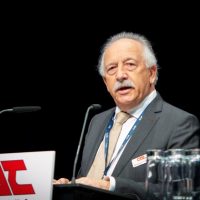
APATS Conference Chair
Captain Drappier is a former Sabena management pilot. He started as a Cadet, and moved up the rands as FO, then as Captain. Whilst with Sabena he held various positions in the training and flight operations departments, ranging from instructor pilot to Director of the ab initio school, ending his time with them as Executive Vice President of Operations. At Airbus for four years he was responsible for all training programs, followed by two years as Senior Director Flight and Cabin Crew Training. His responsibilities included the development of all A380 training material. In 2007 he took the position of Vice President Training and Flight Operations, responsible for all training matters including four Airbus training centers, and all Flight Ops deliverables like operational documentation, performance software and safety management systems.
From January 2015 Jacques took on the role of Conference Chair at APATS, and in 2018 took over the Conference Chair of EATS.
Jacques Drappier has 14,500 hours and has flown all Airbus types from the first A300B2 to the A380 and is instructor on all Airbus FBW.

Pilot Conference Moderator
Professor Paul Bates received the great honour of being appointed as Professores Emeriti (Professor Emeritus) at The University of Southern Queensland, Australia (UniSQ) in 2022. Prior to his investiture as Professores Emeriti, Paul held the position of Foundation Professor and Head of Aviation at UniSQ. He held that position from 2015 when Aviation was launched at UniSQ. Before this appointement Professor Bates was Head of Aviation at another Australian University for approximately 20 years. Graduates of Programmes he has designed and managed work in around 50 different airlines around the globe. Paul presided over the creation of the first Qantas Cadet Programme with a University and has worked closely with other colleagues to develop cadet programs with other airlines. He has been awarded Australia’s highest honours in University Teaching and Learning. Paul is very active in Aviation Safety research and has supervised numerous Doctoral research projects all with active industry participation. He has published numerous articles in Learned Journals and books.
Prior to starting his University career Professor Bates was an Airforce Cadet and then joined the Royal Australian Air Force in Maritime, Strike and finally in Joint Warfare operations. Paul also enjoyed gliding and private flying. He has worked as a Member of the Australian Tertiary Education Quality Standards Agency Panel of Experts and continues as an Expert for the Hong Kong Council for Accreditation of Academic and Vocational Qualifications.
Paul is currently working with ICAO to develop a Programme known as Univair Plus which provides recognition of Aviation Universities. Professor Bates has a lifetime of experience in Aviation and higher education and he continues to work closely with Airlines, International Organisations and young people and this gives him a unique perspective on this industry.
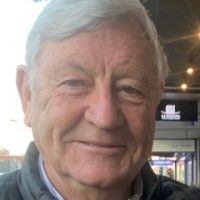
Cabin Crew Conference Moderator
Trevor Jensen began his aviation career in 1967 as a Qantas Cadet Pilot. He served as Technical Director of the Australian International Pilot’s Association before being appointed to the Qantas Flight Operation’s management team in 1982, where he held several senior appointments, including Superintendent Flight Safety and General Manager B747 Operations.
Resigning from Qantas in 1996, he has since held “C” level appointments in large international/Domestic airlines, Low-Cost airlines, and freight airlines within Australasia, Asia, and Europe. Most recently, he was Chairman of the Board of Nauru Airlines Corporation.
He has held regulatory responsibility for Air Operator Certificates and Certificates of Approval (Maintenance) issued by the Australian Civil Aviation Safety Authority (CASA), the New Zealand CAA, and the Myanmar DCA.
With strong commitment and passion for educating future aviation professionals, Trevor has held appointments in academia at several Australian Universities and has served as a member of the Aviation Study Group of Linacre College at Oxford University.
Trevor is a Fellow of the Royal Aeronautical Society, a Fellow of the Safety Institute of Australia, a Fellow of the Chartered Institute of Transport and Logistics and a Liveryman and Master Air Pilot of the Guild of the Honourable Company of Air Pilots.

Maintenance Conference Moderator
Stuart is an aviation maintenance professional, like many, his first role was as a heavy maintenance apprentice. Starting with Ansett Australia in the mid 90s as an Avionics technician. After Ansett folded he completed a number of roles including one in workplace health and safety training.
In the mid 2000s he put his training and aviation passion together, developing specialized maintenance training for Cobham’s (now Liedos) fleet of border patrol aircraft, and in general, aircraft maintenance training. A quick lets call it “sabbatical” running a TAFE (community college) campus it was back to Cobham in 2015 this time to develop training for search and rescue aircraft, followed by taking on the 145 and 147 training manager roles in 2017.
Now with about 25 years of maintenance and training under his belt, Stuart has started his own training consultancy, Aerotrainingx, largely working with smaller MROs to make training and compliance easier for them, but all MROs and MTOs on trainer and training development.
Hi everyone, I’m really passionate about learning and aircraft maintenance. I call myself a learner of learning. It’s part of the reason why I think APATS is great, we bring together industry leaders and innovators. This year we have put together a great line-up of speakers, and probably like all maintenance training, some of the best ‘learning’ happens on the breaks and in this case some networking.

